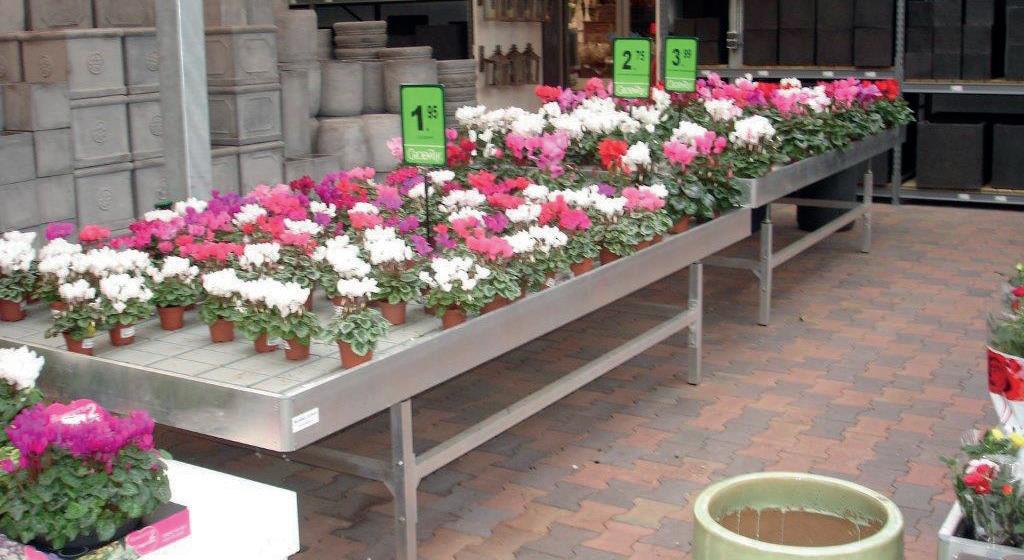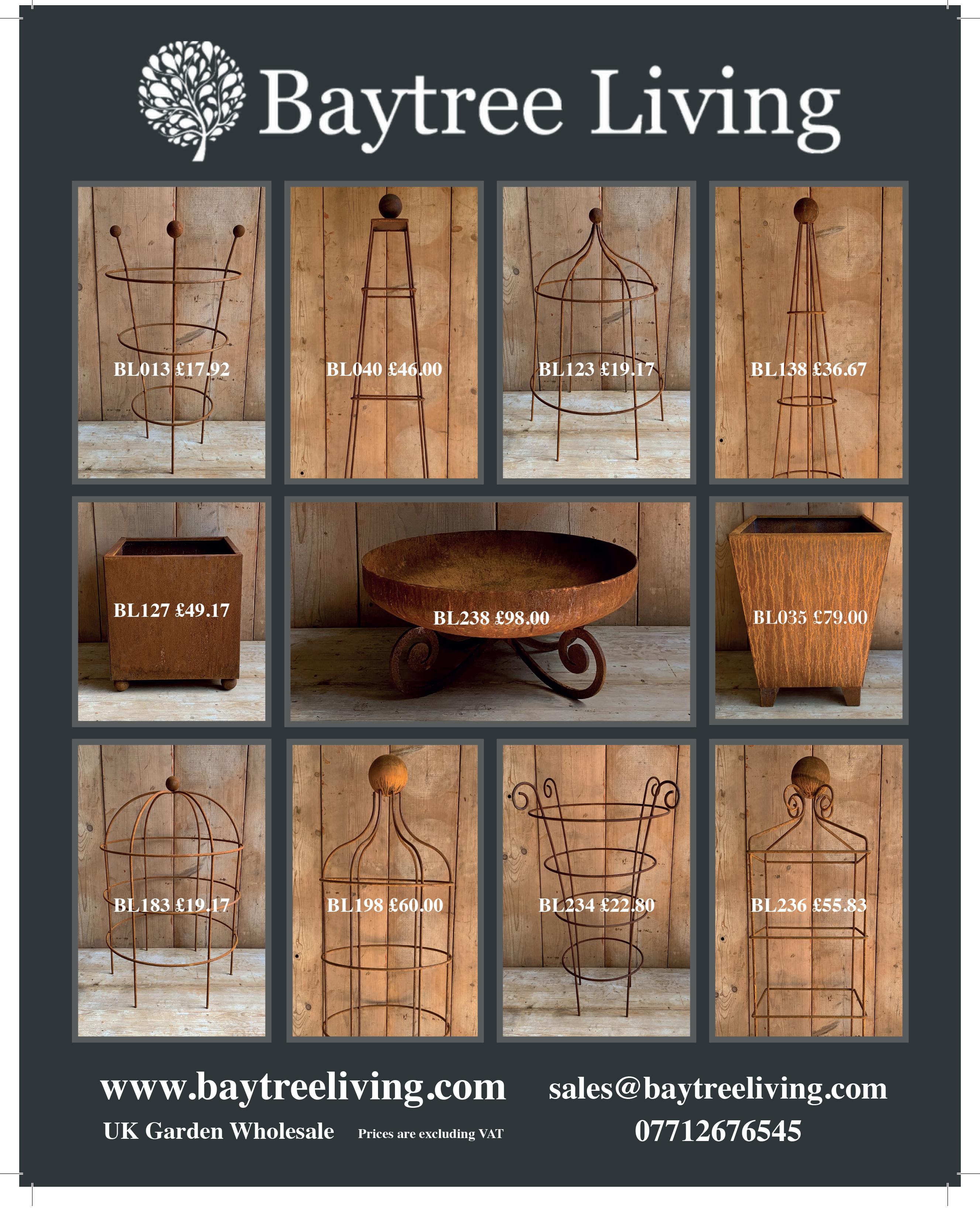LUCY NIXON AT THETFORD GARDEN CENTRE EXPLAINS THE PROCESS

GETTING READY FOR THE GARDENING SEASON
ANDREW BURTON IMPLORES BUSINESSES TO PUSH FORWARD

LUCY NIXON AT THETFORD GARDEN CENTRE EXPLAINS THE PROCESS

GETTING READY FOR THE GARDENING SEASON
ANDREW BURTON IMPLORES BUSINESSES TO PUSH FORWARD









The Webb Eco range has introduced a new Tool-Only option, offering incredible value and flexibility for customers. This new option is designed to make expanding the collection easier and more affordable than ever before.
With the Tool-Only option, you can purchase additional machines without needing to invest in extra batteries or chargers. This is perfect for those who already own a Webb Eco tool and want to build their collection while saving money.
Customers can now expand their Webb Eco collection while saving money!



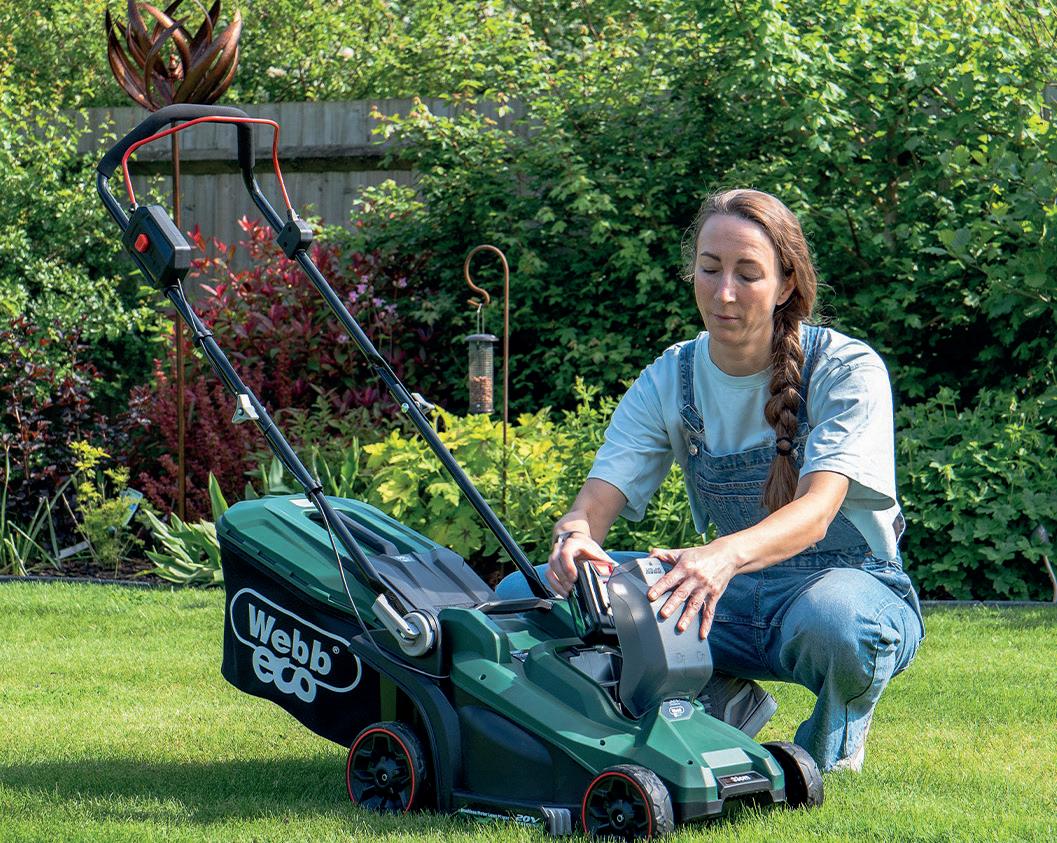





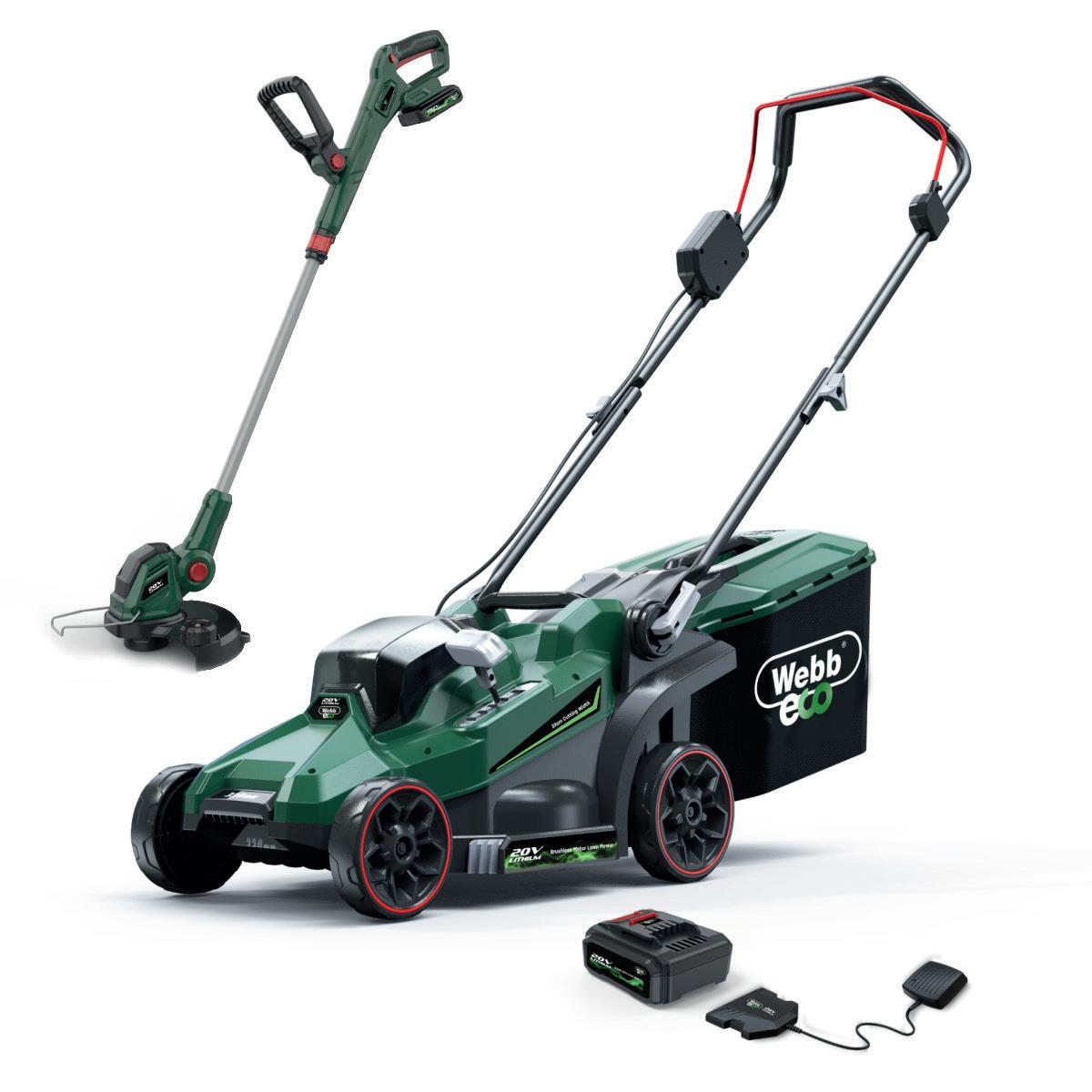


Effortlessly maintain your garden with the Webb Eco Twin Pack, featuring a powerful 20V cordless rotary lawnmower and linetrimmer. Designed for value, convenience, and eco-friendly performance, this duo provides all you need to achieve a neat
Both tools share interchangeable 20V batteries, reducing downtime and saving you money. Engineered for durability


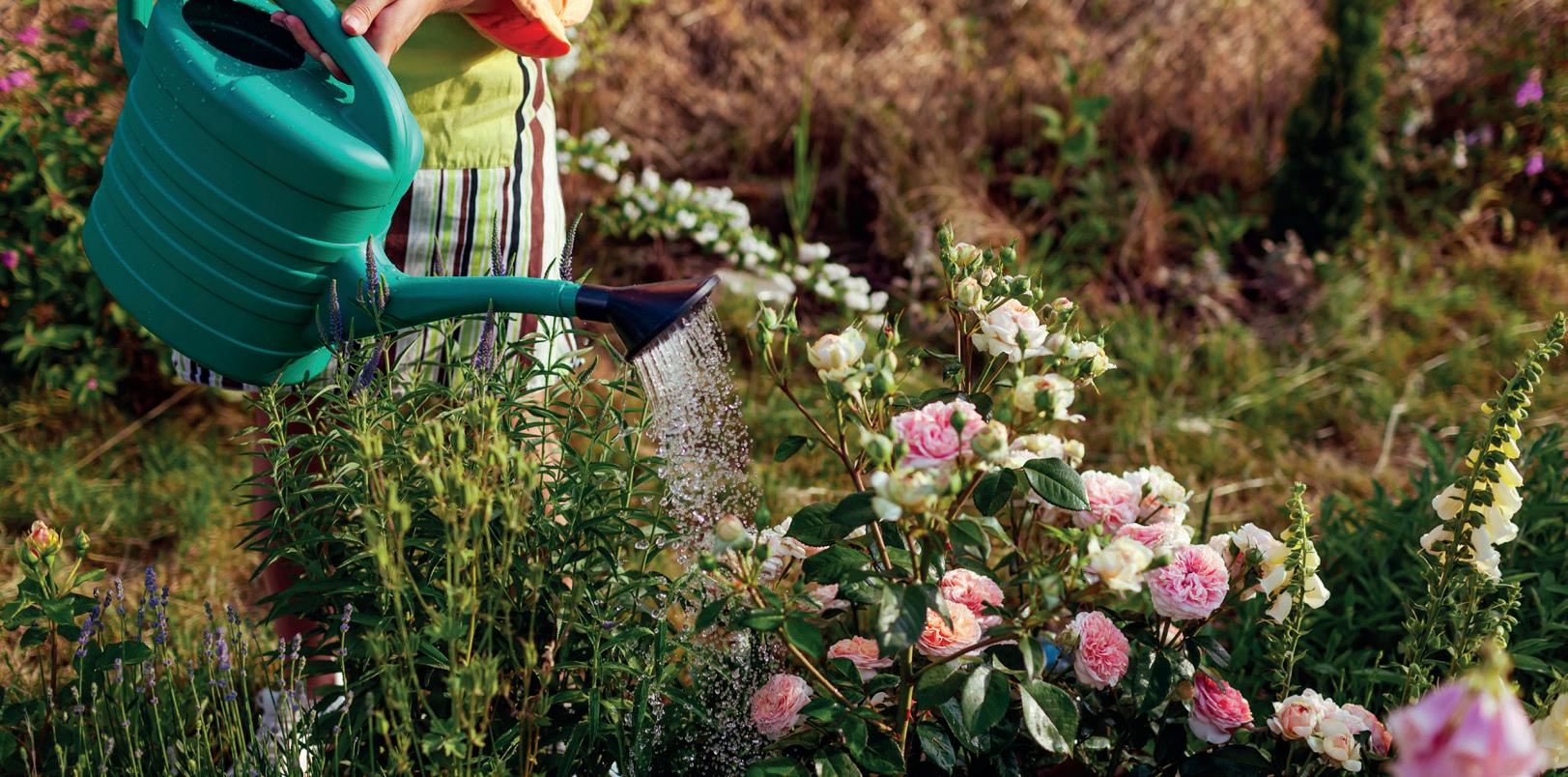


Eljays44 Ltd
GIMA shares the ways their members are there to help and grow the garden retailers
elcome to the February issue of Garden Centre Retail.
The UK garden centre sector has already seen some movement in 2025, with the progress of the Dobbies restructuring plan, acquisitions from Squire’s Garden Centres, and the news that Hillier’s Garden Centres will be saying goodbye to operations director Chirs Francis this summer.
expecting to see a lot more of over the next five years.
13 – User generated content
Beth French of Honest Communiations shares her expertise on why your customer’s content is marketing gold for your business.
This got me thinking about the constant reinvention of the sector, and also how this constant adaptation has not affected the core of the market. This industry is full of familyowned and family-run businesses, and the warmth and knowledge sharing between these legacy businesses is so inspiring to me. Take our interview feature in this issue. I spoke with Lucy Nixon, second-generation managing director of Norfolk-based Thetford Garden Centre.
15 – The first UK B Corp certified garden centre
Sticking with this theme, we also have a feature on product diversification, and some of the new areas that garden centres have forayed into to remain relevant. The businesses in this sector are constantly innovating, and with the staff talent across the board, I’m sure there will be areas that have yet to be explored but will be mightily successful – whether that’s this year or beyond.
Garden Centre Retail catches up with Thetford Garden Centre to talk about the process of B Corp certification.
18 – Targeting the younger generation Industry expert Cassie King shares how some of the UK’s leading garden centre businesses are adapting to bring younger customers through their doors
Lucy has maintained the family feel within the business that her parents set up in the 80s but has adapted to modern beliefs with the award of the B Corp certification. Merging the traditional with the modern way of business, focusing on sustainability and community engagement, is definitely something I’m
BizSpace, Courtwick Lane, Littlehampton, West Sussex, BN17 7TL
EDITORIAL
Head of content – Joe Wilkinson
joe.wilkinson@eljays44.com
Tel: 01903 777 587
Content subeditor – Carmel Mary carmel.mary@eljays44.com
ADVERTISING
Portfolio director – Luke Page luke.page@eljays44.com
Tel: 01903 777 580
Sales director – Rob Dwyer rob.dwyer@eljays44.com
Tel: 01903 777 573
Event manager – Tom Glasby tom.glasby@eljays44.com
Tel: 01903 959 391
Commercial director – Estefania Moreno estefania.moreno@eljays44.com
Tel: 01903 959 395
MANAGEMENT
Managing director – Jamie Wilkinson
27 – How EPoS is shaping the hospitality industry
CIRCULATION
Subscription enquiries info@eljays44.com
Tel: 01903 777 570
Printed by Stephens and George Ltd
Published by ©Eljays44 Ltd
Garden retail experts Davidson Richards talks us through how EPoS systems like their own can help garden centres improve efficiency, reduce costs and encourage loyalty.
2025 already seems like a year that will be positive for the market. We’ve not had the easiest time of it recently, but the conversations I’m having, mere weeks into the year, has filled me with excitement. I can’t wait to see what happens over the next 12 months.
In the meantime, enjoy your read this month, we’ll be back with more in March. Please feel free to reach out to me with any news, achievements or comments, I always appreciate it.
22 – Product diversification
Joe Wilkinson
How has product diversification helped with the success of the garden retail industry, and what areas do garden centres now cover?
Joe Wilkinson Head of content
Garden Centre Retail is published by Eljays44 Ltd. The 2024 subscription price is £125. Subscription records are maintained at Eljays44 Ltd, BizSpace, Courtwick Lane, Littlehampton, West Sussex, BN17 7TL. Articles and information contained in this publication are the copyright of Eljays44 Ltd and may not be reproduced in any form without the written permission of the publishers. The publishers cannot accept responsibility for loss of, or damage to, non-commissioned photographs or manuscripts.
Garden Centre Retail picks out some of the summer flowering bulbs that your customers would like to see in store.
31 – Christmas trends
A round up of some of the trends we’re expected to see for the 2025 festive period.
Whilst every effort has been made to maintain the integrity of our advertisers, we accept no responsibility for any problem, complaints, or subsequent litigation arising from readers’ responses to advertisements in the magazine. We also wish to emphasise that views expressed by editorial contributors are not necessarily those of the publishers. Reproduction of any part of this magazine is strictly forbidden.
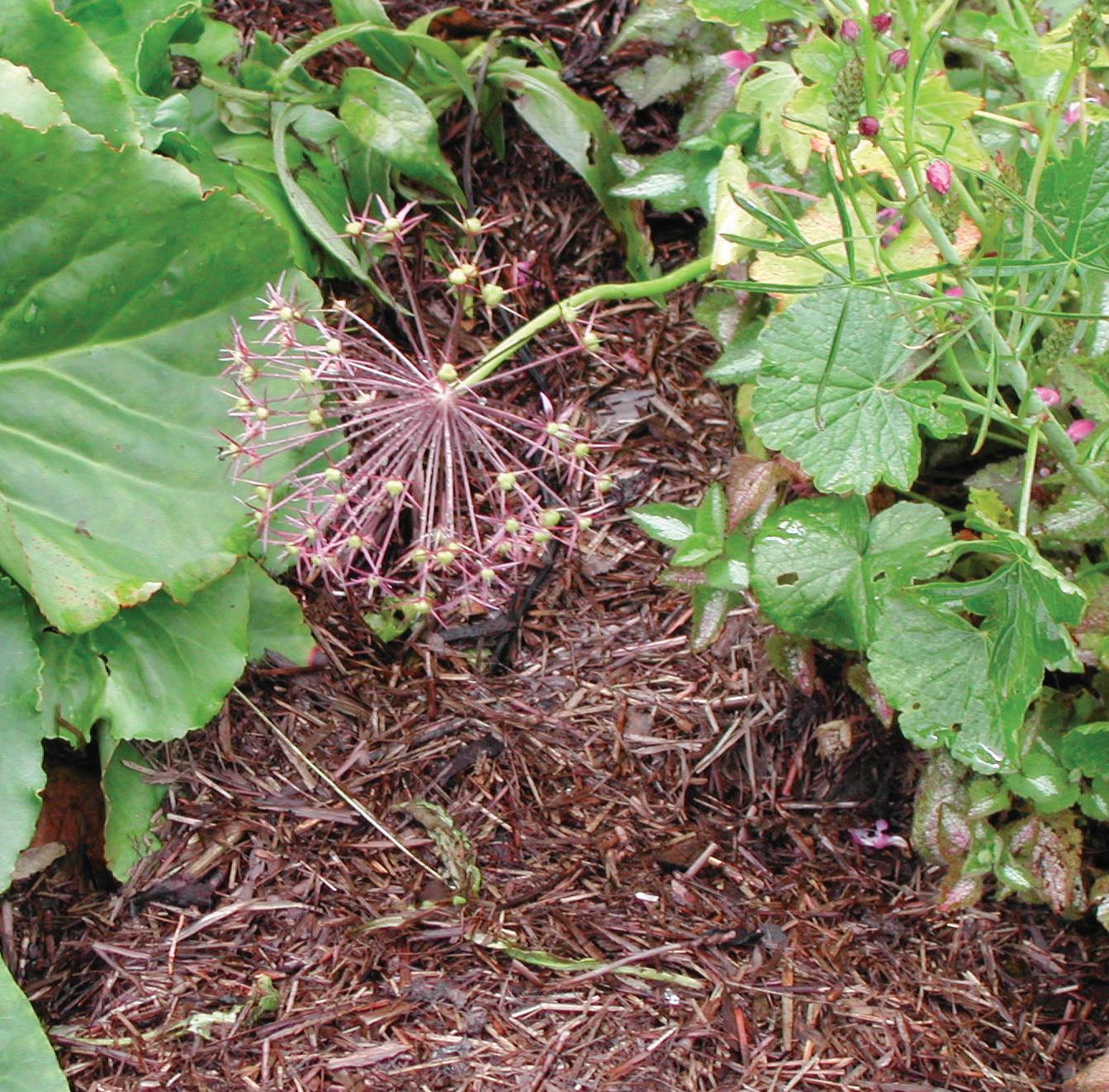
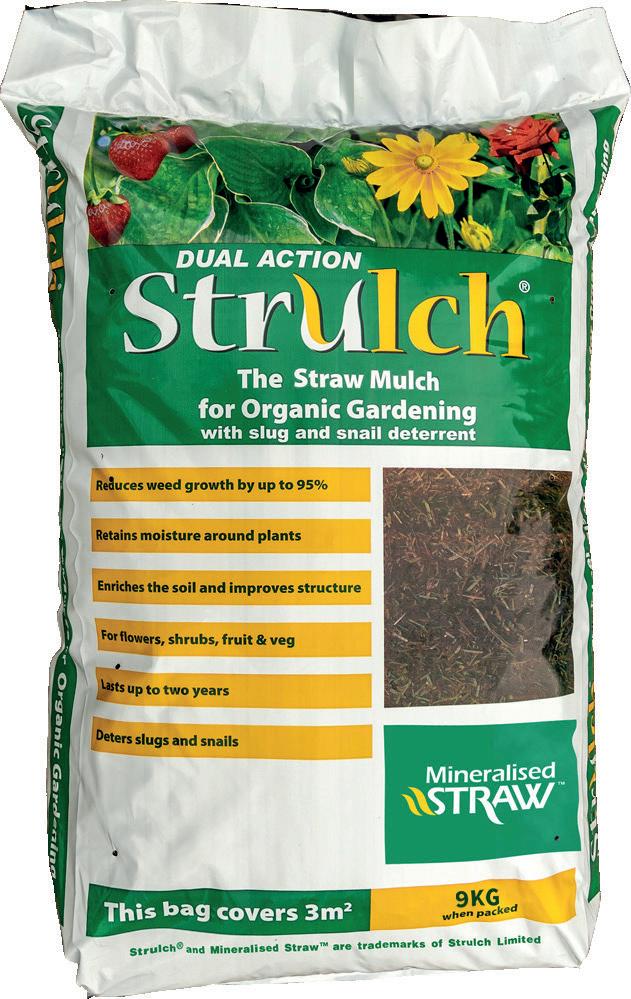
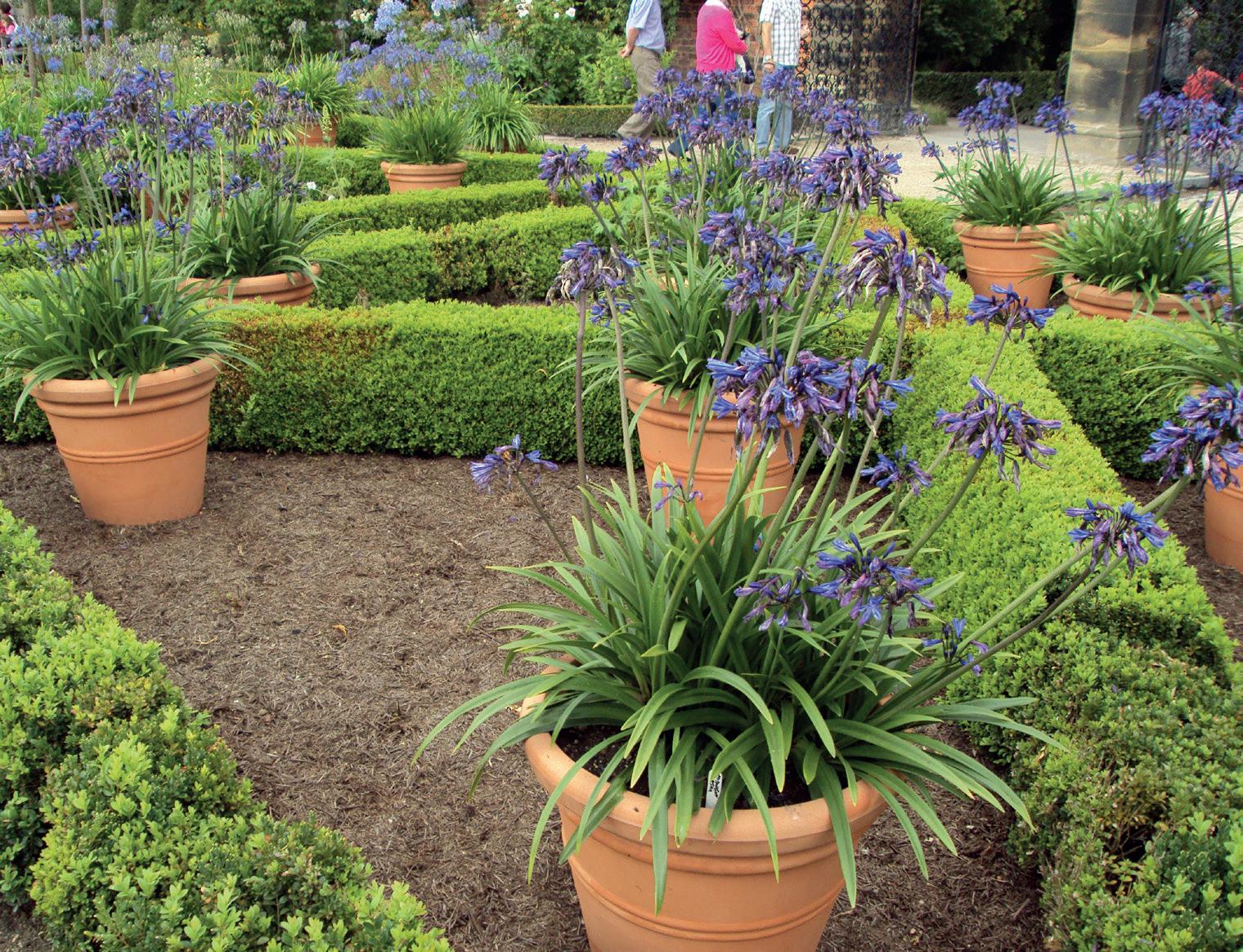
7 – Looking ahead
CEO Peter Burks previews 2025 for the garden centre sector


– Supporting retailers
GIMA shares the ways their members are there to help and grow the garden retailers

10 – The year of courage Andrew Burton of Pleydell Smithyman talks courage, and how businesses can use 2025 as a year to take those daunting steps.
13 – User generated content
Beth French of Honest Communiations shares her expertise on why your customer’s content is marketing gold for your business.
15 – The first UK B Corp certified garden centre
Garden Centre Retail catches up with Thetford Garden Centre to talk about the process of B Corp certification.
18 – Targeting the younger generation
Industry expert Cassie King shares how some of the UK’s leading garden centre businesses are adapting to bring younger customers through their doors
22 – Product diversification
How has product diversification helped with the success of the garden retail industry, and what areas do garden centres now cover?
27 – How EPoS is shaping the hospitality industry
Garden retail experts Davidson Richards talks us through how EPoS systems like their own can help garden centres improve efficiency, reduce costs and encourage loyalty.
30- Summer-flowering bulbs
Garden Centre Retail picks out some of the summer flowering bulbs that your customers would like to see in store.
31 – Christmas trends
A round up of some of the trends we’re expected to see for the 2025 festive period.

Your Key to achieving, radiant, silky soft, healthy skin within minutes

“This is my go to Gel! My skin has never been as good as it is right now”



Iwonder how many of them really come true, but as we have long forgotten what was suggested for 2024, I’m sure it’s safe to say almost anything. However, there are definitely a number of topics hot on our Garden Centre Association members’ agendas that need tackling in 2025.
Probably the most urgent task is to come up with strategies to deal with the significant increase in business costs added to the last budget. Despite what the chancellor might say, most businesses, in any sector, do not have a big pot of money on hand to be able to use to cover these.
There will be price increases forced on us by our suppliers, as they too try to cover their added burden of cost. It is hard to reduce one’s labour head count, as our sites are large and need coverage for both customer service and security, and to get the tasks done, particularly with plant maintenance. We are definitely a people-focused business, and our customers like that too.
I think centres could get advice on perfecting their internal layouts, space management for each category and customer flows. This is usually a relatively inexpensive project, as it hopefully means just moving and
rearranging shelving, benches and stock.
It’s that wonderful time of year when we are all making great predictions about the year ahead.
Make sure enough space is devoted to the winning categories, which we can see from our Barometer of Trade is headed up by catering. ‘Pop-up’ catering offerings are known to add turnover without reducing core catering sales, so could be an option if space allows.
Whilst mentioning the Barometer of Trade, of course, data is key, so belonging to an organisation such as ours allows you to see what other centres are doing well at and maybe you could emulate them. Our annual GCA inspections also give an insight into what you are doing well and what needs some attention too. It’s really useful to have this insight.
The gradual move to growing in and retailing peat-free compost has definitely brought its challenges and our customers are reporting this in some volume. It’s great to see and hear of the excellent work our compost manufacturers have been doing to improve the quality and consistency of the products on offer.
There have also been a couple of strong initiatives from within the industry to help educate and motivate both our retail staff and the gardening public. The first has resulted in a video produced through collaboration between
the GCA and the RHS. This will be available for garden centres to post on their websites and we hope they will even have it playing in their compost sales area to give staff and customers tips on how to choose their compost correctly, and on how to look after plants growing in these peat-free composts.
A second initiative, hosted by Trewin Restorick, has brought together a wide range of industry personnel from retailers, growers, manufacturers, and NGOs again with the sole aim of getting the same message across to our customers. This will be launched in early spring.
A third initiative has been hosted by the HTA and is linking growers and retailers to improve the quality of our planterias. Growers often have a much greater understanding of how to care for the plants they produce and, with the added variability that these new composts bring, will be passing this knowledge on to our staff.
So some great stuff going on, but the best news we would love to see is a few sunny weeks during the spring peak season!

As retailers continue to navigate a tough landscape, we look at what suppliers within GIMA doing to support garden centres and help drive growth.
Reliable supply and a close working relationship help garden centres meet peaks in demand without having to hold stock in anticipation. “We understand how important it is for retailers to minimise risk,” says Alexandra Mangan, General Manager, Greenkey Garden & Home General, adding that Greenkey supports its customers every step of the way. “Our low minimum order values make it easy for retailers to restock high-selling SKUs, while our next-day delivery ensures they stay ahead of demand. Effective communication is a priority, our friendly, inhouse experts are always on hand to answer calls and resolve technical questions or issues. Backed by a large stock of spare parts, our team acts as partners, not just suppliers. At Greenkey, we’re dedicated to helping garden retailers grow, adapt, and thrive.”
Meanwhile, Taylors Bulbs has a team of account managers who are directly employed and only sell its product. National Accounts & Marketing Manager, Ian Clark explains: “This enables Taylors to give a first-rate service to customers, advising retailers on range planning, merchandising, training and promotional activity to maximise their sales and profit.” He adds: “We provide printed POS material to back up our products, and this is also available to our customers in digital
format, so they can edit and personalise material for their own stores. For those retailers that sell bulbs online, Taylors also provides product imagery and a features and benefits spreadsheet.”
FITT, a leading global group and Certified B Corporation, is a pioneer in the production of solutions for the transfer of fluids for domestic, professional and industrial applications. With its headquarters in northern Italy, FITT exports to 100 countries, has 1.250 employees, 15 production sites (nine in Italy, five in Europe, and one in the USA), 15 logistics sites worldwide and five subsidiaries.
FITT prides itself on building long-lasting partnerships through a high-quality range, expertise, reliability, innovation, market leadership and multi-plant organisation.
FITT Kiuma, the new garden hose completely PVC-free, is the new domestic irrigation hose developed by FITT and is the result of FITT’s commitment to quality, userfriendliness and sustainability. Creating opportunities
GIMA members are also working to help keep retailers ahead of the curve and tapped into key trends that are shaping the marketplace. Yotrio Group UK Channel Manager, Emma Treanor explains: “At Yotrio, we leverage the expertise of over 450 designers and engineers and invest millions annually in R&D to bring
the latest, trend-led furniture designs to market. Through MWH, our trusted brand, we deliver innovative solutions tailored to the garden sector. Sustainability is integral to our process, starting at the design stage with eco-conscious materials and continuing through responsible manufacturing practices that prioritise reduced environmental impact and ethical production.”
David Nicholson, UK NEU & ROW sales manager at Elho, says: “Sustainability is set to remain a key focus in 2025, with both consumers and manufacturers prioritising eco-friendly choices. At Elho, our commitment to creating a net-positive impact drives every one of our innovations. Our newest launches will allow retailers to offer a broad range of truly sustainable products made from 100% recycled plastic using renewable energy–for both the garden and inside the home. For example, Elho’s new green basics composter offers consumers a contemporary, affordable and easy-to-use solution for greener gardening, while the winery collection transforms discarded plastic twines gathered from French vineyards into stylish houseplant pots.”
He concludes: “By ensuring Elho’s innovations combine sustainability, style and practicality, we can empower retailers to meet demands for environmentally friendly solutions, while having a positive impact on the planet.” This sentiment is echoed by manufacturer
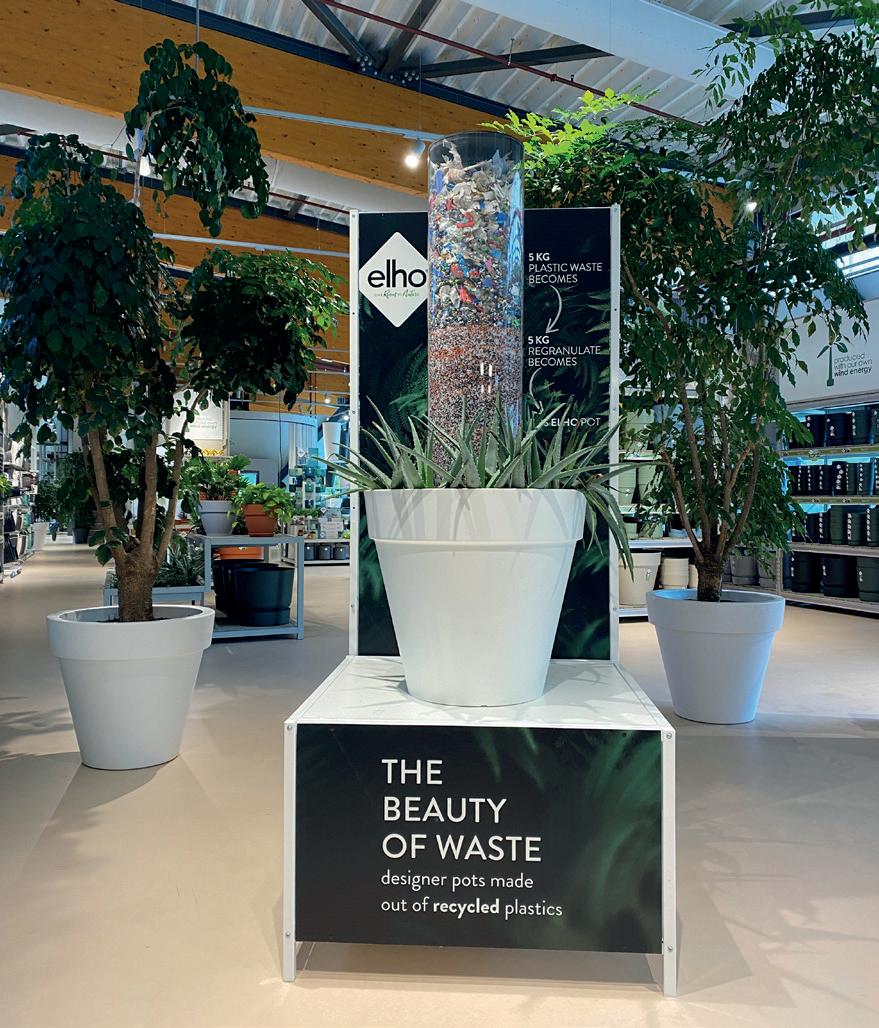
of garden irrigation products, Claber Spa, as its marketing department says: “Claber, as a brand, has always stood out for its up-todate innovations. Even more so today, in a panorama of changes driven by new ecosustainability trends, the company offers various options to garden centres to provide consumers with solutions that are in line with new market demands. One example is the Aqua-Magic System, an independent drip irrigation kit powered by a photovoltaic panel and rechargeable batteries that uses water from any tank. On the other hand, myAquaSolar is a new range of tap timers programmable via app, powered by solar energy alone, without the use of any batteries.”

Helping to drive sales in hard landscaping and elevate the way these products are visualised, Meadow View Stone is pioneering Augmented Reality (AR) accesses on a standard smartphone’s camera. This will enable users to map a 2m x 2m sample swatch of the product in store, within the surroundings, or in customer’s chosen home
environment. Managing Director, Sarah Hill says: “With statistics claiming that two thirds of all shoppers think AR would help them make a better buying decision, Meadow View Stone was keen to be the first to implement this cutting-edge technology to aid sales for our customers. This AR technology also won the prestigious Retail Services and Experiences Award at Glee.”
Yotrio’s Emma Treanor adds: “Our merchandising solutions maximise instore impact, while tailored product training helps garden centre teams foster emotional connections with customers, presenting our ranges as part of a lifestyle. Together, we drive innovation, footfall, and customer satisfaction.”
Something that GIMA members also have in spades, which serves garden retailers well, is a wealth of innovative and exciting products to help garden centres build a stand-out, quality offering that solves real gardeners’ problems.
With 30 years of expertise in outdoor living and premium garden storage solutions, Biohort offers retailers the chance to stock products that combine style, durability, and practicality.
“The UK represents a key market for Biohort,” says International Head of Sales, Karin Palmetshofer-Hörschinger, “where our superior quality and innovative design resonate with customers seeking reliable and long-lasting solutions. Proudly designed and manufactured in Austria, Biohort products come with a 20-year guarantee and are built to last for generations.”
“We help retailers stay ahead of the curve with the Qwickhose range,” says Rivendale Products Business Development, Manager Michelle Doughty. “Our innovative Wing-Lock Hose Connectors have been distinctively redesigned after 60 years, by replacing the breakable, perishable teeth of traditional connectors with our innovative Wing-Lock system. Equipped with ridged barbed jaws, they provide unrivalled hose grip, eliminating pop-offs, and reducing water wastage. The robust and dependable Qwickhose range is manufactured in the UK using UV stabilised plastics for greater durability.”
GIMA members look forward to another year of working closely with and supporting garden retailers, nurturing relationships and growing the sector together.
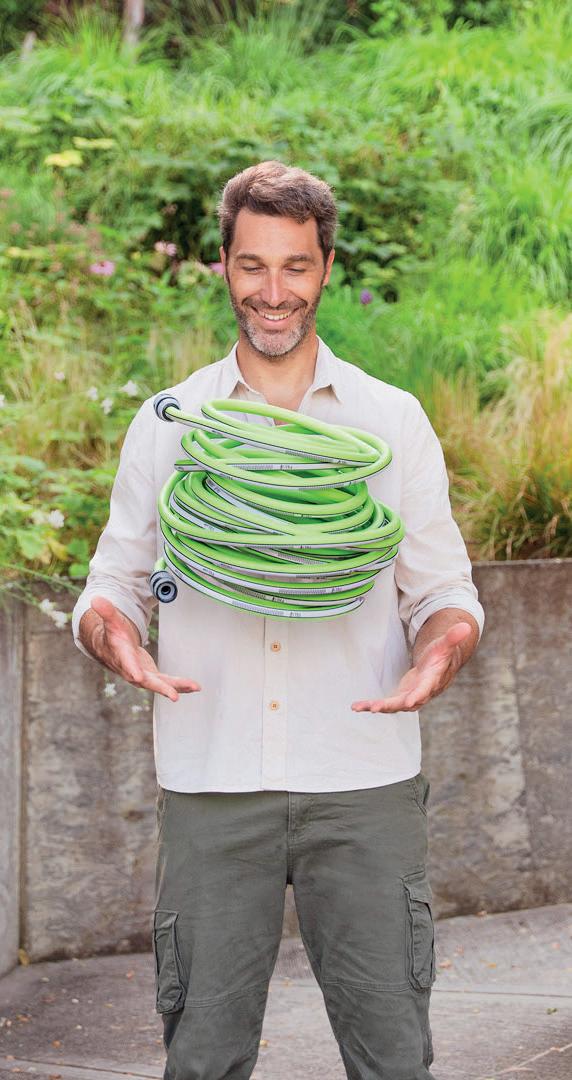
GIMA is a membership organisation of around 170 companies representing the majority share of suppliers and manufacturers in the UK gardening industry. Its goal is to promote the commercial, trading and industrial interests of its UK and EUbased members. Run by a team of professionals, and governed by a council of members, GIMA is funded by membership subscriptions and services. Its extensive range of services and support caters to all members.
gima.org.uk

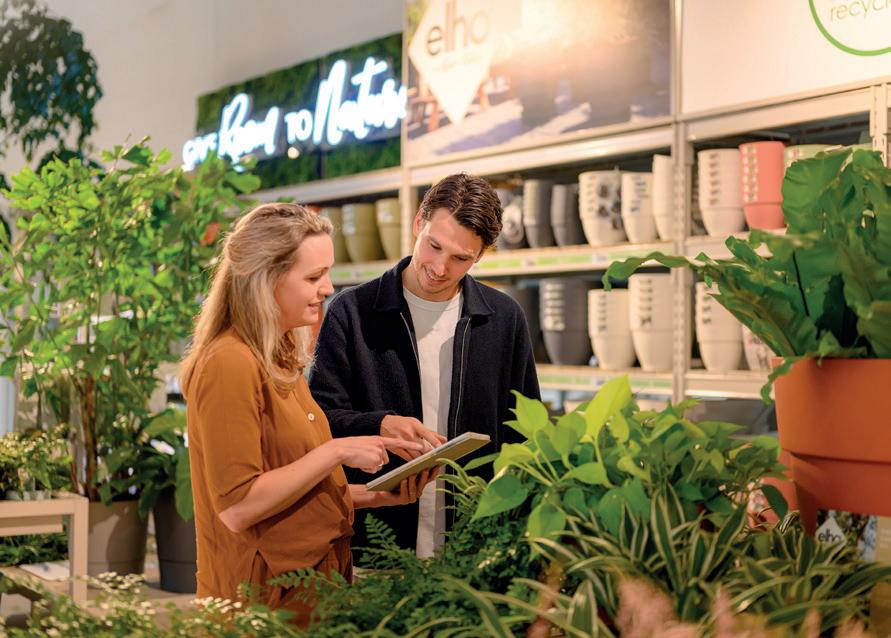

As we step into 2025, the year of courage, businesses are bracing for a transformative journey.
The government policy and tax changes of 2024 have posed significant challenges, leading to increased costs across the industry. In response, 2025 will see garden centres making bold, aggressive changes to safeguard profits and, in some cases, ensure survival. This year demands courage from owners and managers to implement swift and sometimes drastic changes. Yet, amidst the challenges, there is potential for positive transformation. Andrew Burton of Pleydell Smithyman explains further.
When I consider the word courage, even though many say work is my primary focus, I often think about people and situations outside of business first. I think about courage at all kinds of levels, from Ukraine’s soldiers and the bravery they show every day, through to sports people such as Bethany Hamilton who is an American
professional surfer and writer, who in 2003 survived a shark attack in which her left arm was bitten off, she returned to professional surfing. She is quoted as saying “Courage doesn’t mean you don’t get afraid. Courage
COURAGE DOESN’T MEAN YOU DON’T GET AFRAID. COURAGE MEANS YOU DON’T LET FEAR STOP YOU
surfing, I think about the sea, the adrenaline and ultimately it leads me to think about the word waves. There are the waves surfers see every day, but we also have the type of waves we see in different forms in business, especially in our seasonally led, weather affected garden centres. In 2025 we are about to tackle a new set of waves, and these waves are likely to be fast moving, that needs skill and experience navigate, and certainly ones that needs courage to tackle.
means you don’t let fear stop you.” Bethany Hamilton inspires me, and I would encourage anyone to read her books. It is interesting when thinking about
Does courage alone get you where you need it to, and will only courage give you a big enough slice of business often referred to as the cake as you need to achieve your goals? The answer is obviously no – It’s only part of the ingredients you need to make that cake, but alongside all the other ingredients (such as professionalism, reflection, empathy and business acumen) the attitude, motivation and drive to make courageous changes that support your business is essential. There is no doubt courage can be supported by confidence,


so having all the ingredients you need to make your cake is essential and let’s not miss that fact.
My view is that the reactive skills of garden centres are outstanding and as an industry we have shown over many decades that we pivot, drive and thrive in all environments. The experience shines through in our established industry, and the people in it or joining it. The strength of the industry is in our knowledge, passion, honesty and skills, and the attitude to tackle challenges is certainly one of courage.
In 2025 whatever it is a business does, it needs to be courageous and focused. I feel that in a time when some businesses and industries are making cuts and being driven wholly by the bottom line. Our garden centre industry is really rounded in its views, and it has the opportunity, once more, to make calculated, defined and visionary decisions, that will have a positive impact on their business, With the necessary resources, experience, and belief in their capabilities, they are well-positioned
to turn these opportunities into meaningful actions for long-term success.
These decisions can be with regards to areas such as impacting positively on processes, or reevaluating existing performances to make considered change for improvements to profit or developing their business at a time when others are not doing so to increase turnover and footfall. In 2025 whatever it is a business does, it needs to be adaptable, and it needs to be courageous and focused.
It’s early in 2025 as I write this, and I am already seeing numerous business owners taking a step to be better, be braver and be courageous in their approach to the challenges ahead. I’m feeling excited by the attitude and vision of many businesses I work with, but I wonder how many people want to be in a business that drives and thrives, or one that stands still and waits. Only you yourself will know the answer to that when reflecting on yourself, but someone in your leadership team,
one day, needs to have the courage to face the challenges head on, because without this courage to face what is ahead, the challenges will only become harder.
About Andrew Burton
Andrew works for Pleydell Smithyman as an associate director, focusing on garden centre and farm shop advice, with an overarching aim of business strategy and development. He provides site development, and commercial and operational support. He sits on the Farm Retail Association Council, and previously on the Garden Centre Association Board.

andrewb@pleydellsmithyman.co.uk
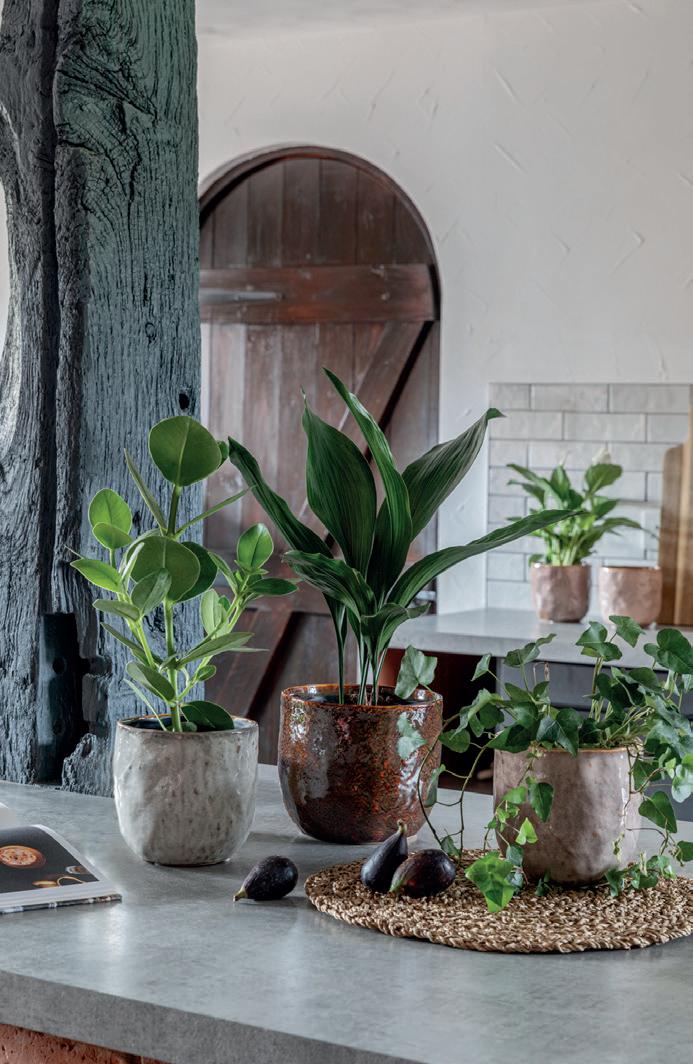
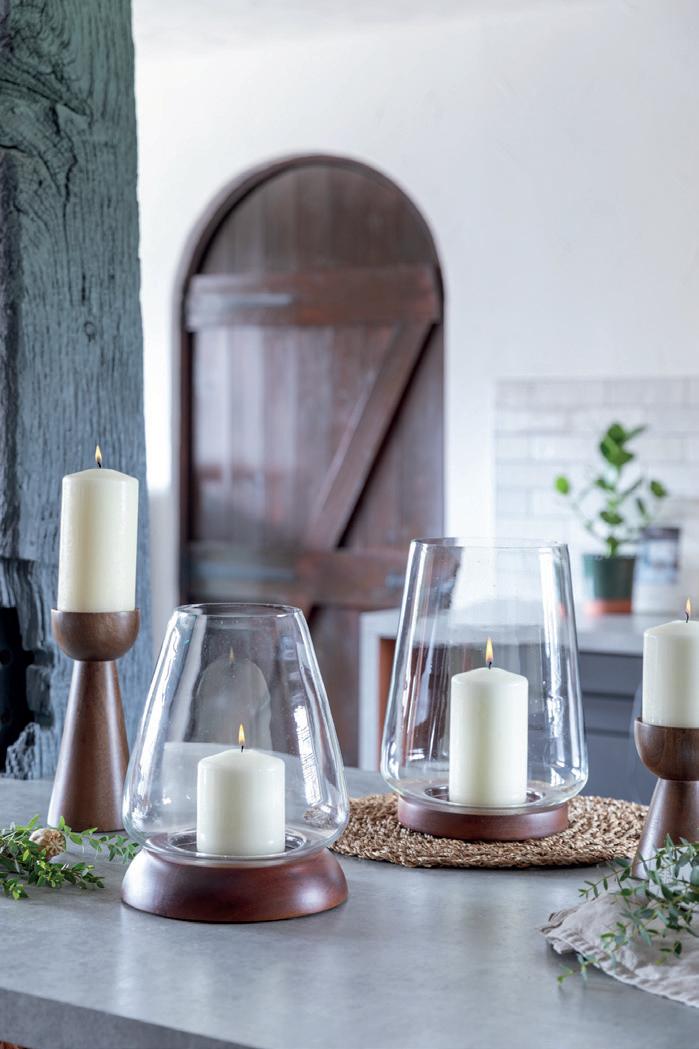

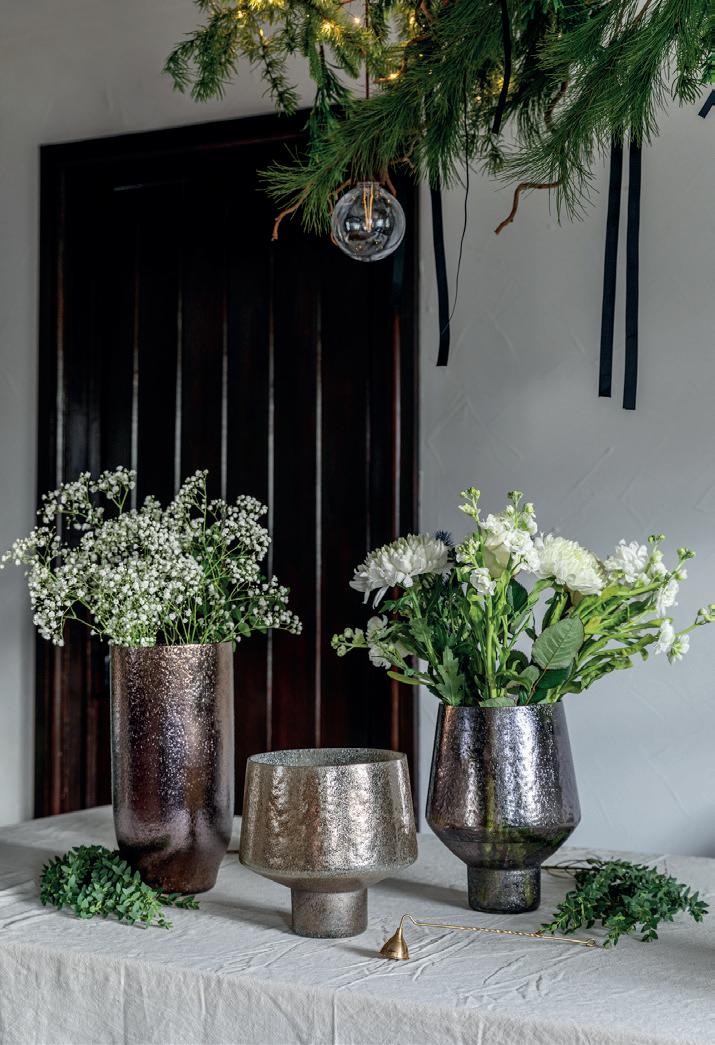
Low MOQ
Indoor planters and home décor
Recycled glassware


Book a showroom visit to discover our NEW collections for 2025: marketing@ivylinegb co uk Stoneleigh House, Stoneleigh Park, Kenilworth, CV8 2LG
Mix and match ranges for easy styling
Sustainably sourced
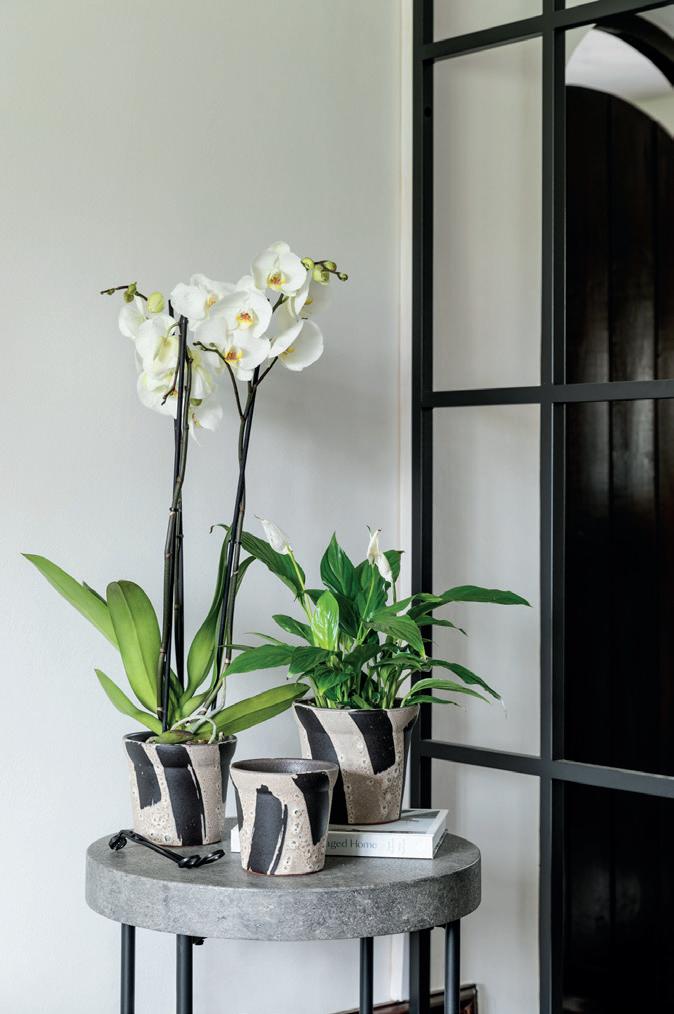
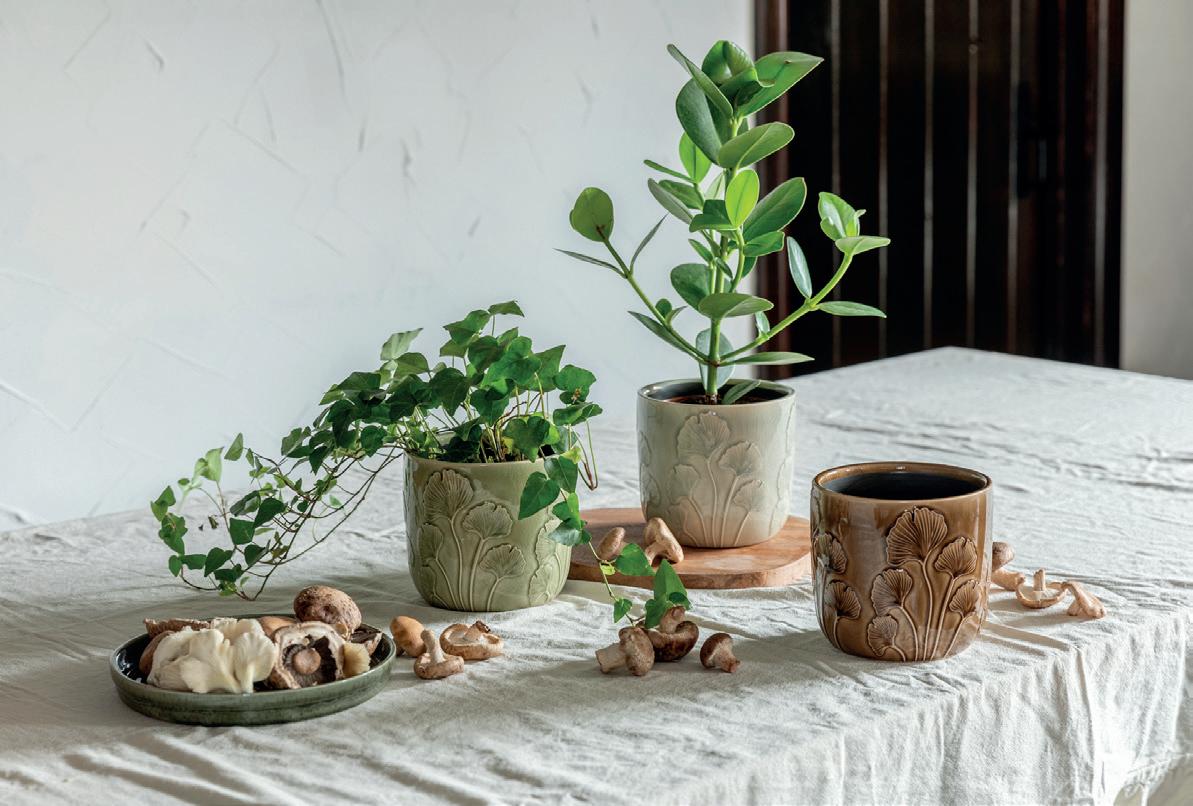
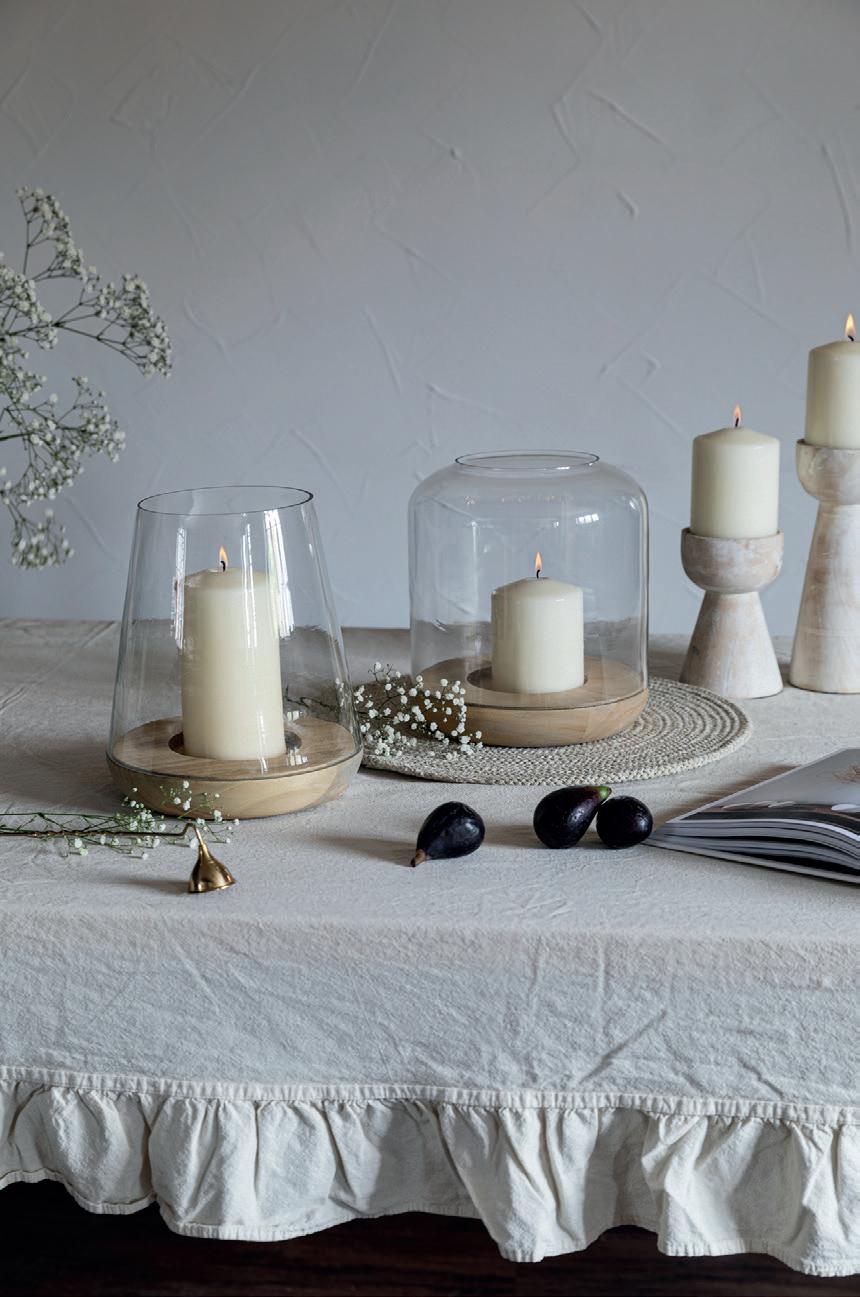
Beth French, account director at specialist home and garden PR agency, Honest Communications, discusses the role of usergenerated content in marketing strategies…
In today’s consumer-driven world, authenticity is king—and few tools are as effective at building trust and engagement as user-generated content. From boosting credibility and loyalty to fostering a strong sense of community and connection, UGC is undoubtedly an indispensable part of any modern marketing plan. But how can brands inspire their audience to get sharing?
What is user-generated content?
First, let’s look at what user-generated content, or UGC, actually is. It is essentially any form of content – whether it’s photos, videos, social media posts, reviews, or blogs – created by consumers rather than the brand itself. It’s the digital equivalent of word-ofmouth marketing, most often amplified across social media platforms.
Why does UGC matter?
This kind of content is invaluable to brands for several reasons:
• As a third-party endorsement, it is highly trusted by other consumers and enhances your brand’s social proof, increasing the likelihood to purchase
• UGC is very cost-effective and often more affordable than traditional marketing avenues
• Authentic content drives engagement, and seeing real people use and celebrate a brand’s product builds credibility
• It fosters a strong sense of community among your audience and sharing their content helps them feel personally connected to the brand
• Over time, you’ll build a bank of content ready and waiting to be used across your marketing channels

Encouraging your audience to create and share content that features your brand or products isn’t a dark art – in fact, it’s incredibly simple. Here are a few approaches you can try:
• Social shout outs
We all know by now that social media is an essential strand of any marketing strategy, but do you know how to leverage it to locate and encourage user-generated content? An easy win is to search relevant account tags, hashtags and keywords to find any existing content out there, and reshare to your platforms. Remember to give credit and return the tag to increase the chance of further engagement! If there’s not much out there already, you can begin building by including a call to action and brand-specific hashtag in your own content.
• Consumer competitions
If there’s one thing gardeners love, it’s the chance to show off the beautiful spaces they work so hard to create. Competitions are a great way to engage with your audience while gathering UGC – simply ask customers to submit photos, videos or stories of something related to your brand and you will be inundated. The Henchman Topiary Awards is a fantastic example of a successful UGC competition – not only did it attract national and regional media coverage, but it also encouraged submissions of hundreds of topiary that the brand can use in marketing materials for years to come!
• Share-worthy moments
In an age where visual platforms like Instagram and TikTok reign supreme, consumers are always on the lookout for that next “Instagrammable moment.” By providing your audience with something share-worthy, you’ll increase the likelihood of someone snapping a quick photo or video and posting it
online. In-store experiences like flower walls or photo frame installations are sure to attract attention, while pretty packaging or a small surprise in a delivery can make for a great unboxing opportunity.
• The power of the influencer People buy from people, and influencer marketing is proof of this! But if you haven’t got budget for paid partnerships, product seeding (or gifting product to several smaller accounts) can be a successful way to secure content. Collaborating with relevant influencers to create and share content can be the catalyst that you need to encourage other consumers to get involved, particularly when a call to action or branded hashtag is included.
• Just ask!
If you don’t ask you don’t get – and the same is true when it comes to UGC. Directly requesting reviews and feedback from customers via email or social media is an easy and low-effort way of encouraging usergenerated content. Provide a simply process for shoppers to leave feedback with an option to include photos or videos and contact shoppers shortly after they have purchased from you. You could even offer a small reward, such as a discount off their next order or entry into a prize draw, to incentivise their involvement.
About Beth French
Beth French is an account director at Honest Communications, the chosen PR and social media agency of many leading garden brands including elho, Hillier, Town & Country, Wolf Garten and Wilkinson Sword. Honestcommunications.co.uk



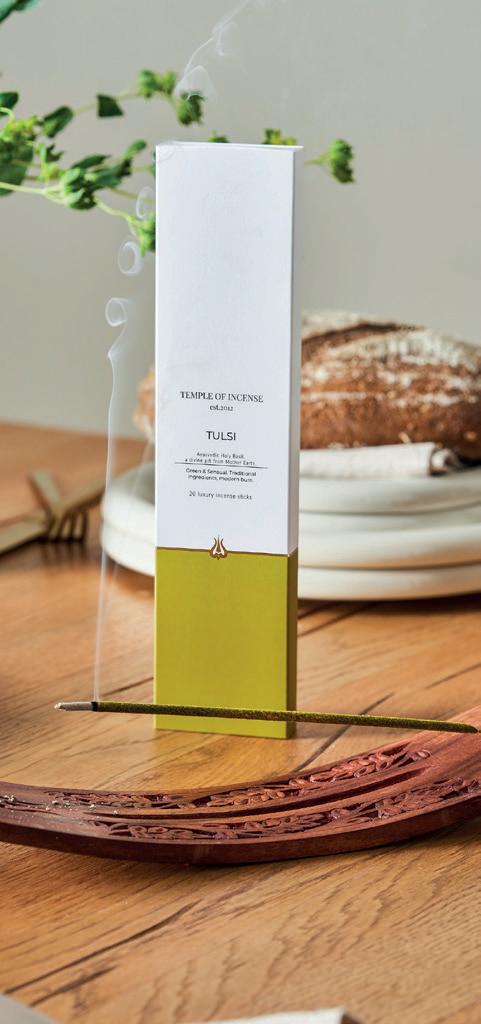
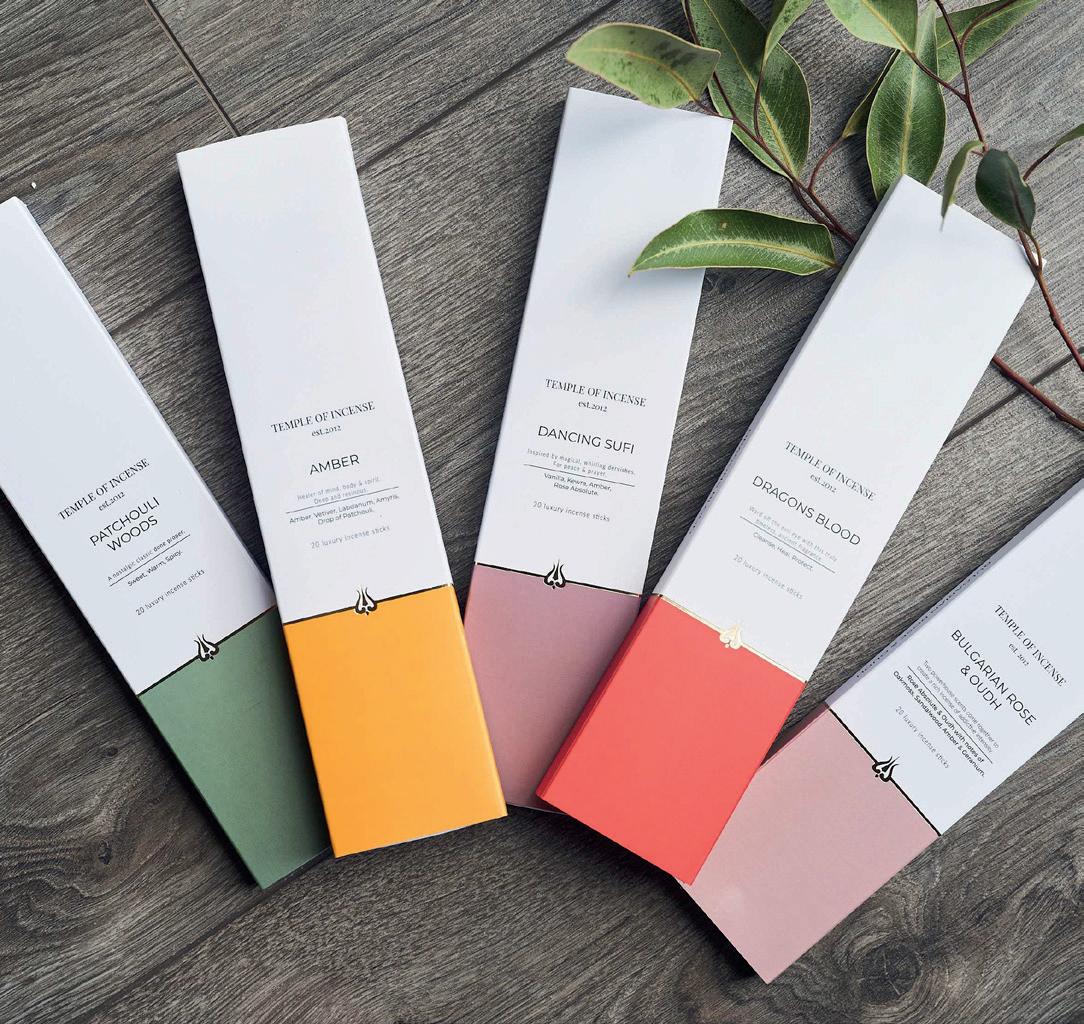




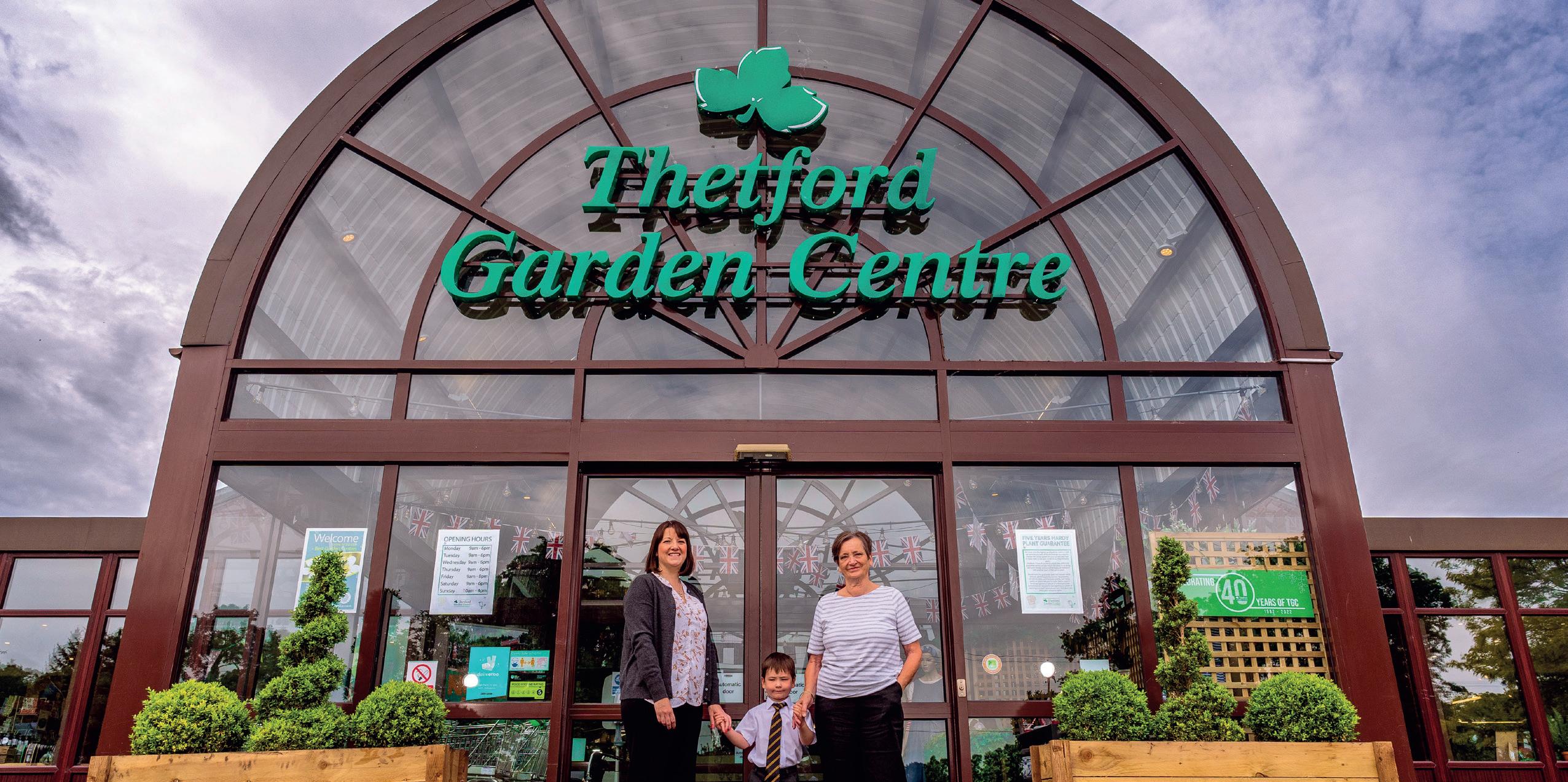
Founded in Thetford, Norfolk, in 1982 by Paul and Jean Nixon, Thetford Garden Centre is now in its fourth decade of business. Headed up by the founders’ daughter, Lucy Nixon, the garden centre has recently granted accreditation from B Corp, global organisation, B Lab.
Ten years after launching the business, Paul and Jean moved premises to their current site in Kilverstone. This site continues to grow and develop, much like many other garden centres.
During this period, Lucy decided to move through the B Corp process, a certification that recognises companies that meet high standards of social and environmental performance, transparency, and accountability across five key areas: governance, workers, customers, community, and the environment.
“When I first started exploring it and looking into the certification,” explains Lucy, “I began by discussing the accreditation with Paul Hargreaves at Cotswold Fayre. His business is certified and he is known as a B Corp ambassador.
“Paul then put me in touch with Andy Hawkins at Business on Purpose, who took me through the process.”
It’s not a particularly easy process, either. According to the B Lab certification guide document, the process involves five steps: measuring impact, improving your score, meeting the legal requirement, submission, including a review, and finally post-certification.
Angela Perry joined the business 18 months ago, and one of her first priorities was assisting the business through the steps.
Describing the process, Lucy said: “We filled in the questionnaire; I started it, and Angela continued the process. We received a lot of support from Andy and from B Lab when we needed it.
“One of the first things you have to do is make a legal declaration that you’re not about profits, and we’ve been working through the process to achieve the pass mark of 80%.”
Talking about the process, Angela Perry, Executive Assistant at Thetford Garden Centre, said: “Whilst B Lab will do everything they can to encourage a participating company to pass, you must provide the evidence to back up the questions you’ve answered. It’s based on a point-scoring system, and during the verification process, your score will reduce.
The pass mark is a score of 80 or above.
The certification is valid for three years, and we realise that over those coming years, we will need to improve processes to improve our score. We understand that we will never be 100% sustainable but will strive to be so, as much as possible.

IOnce that three years time has passed, you go through the process all over again. It’s also worth noting that, because of the stringency of the process, businesses will be marked down in certain areas. But it’s a case of doing everything you can to work towards initially reaching the pass mark, then working on improvements for the next process.
As mentioned above, the B Corp certification is graded on five key areas, and according to Angela, the point system seems to be weighted in certain ways on each of these five metrics. But it’s not just about filling out a questionnaire; you have to back up your answers with evidence, too. With help
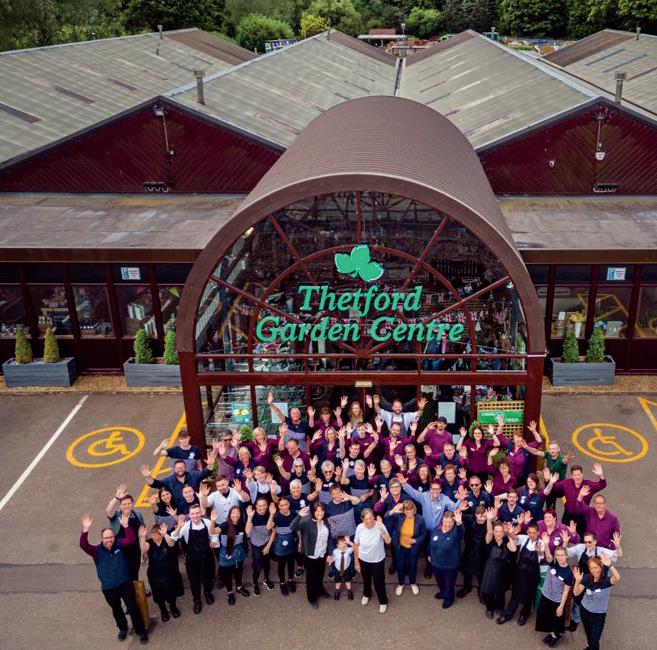
from their partners, Thetford Garden Centre meticulously self-reviewed evidence, making sure it proved their stance.
And what about the challenges? As trailblazers in the sector, there wasn’t much of a resource to pull information or ideas from, so they laid their own path to success. Lucy said: “Being a traditional garden centre, there are some areas we weren’t going to score highly on, such as some of our staff aren’t above minimum wage, because of the market we’re in. scores are also lost if animal products are sold, which we do obviously because we have a restaurant. Some things we accept that we’ll get marked down on and that’s fine. There are other areas we do better on, such as helping the community and using local suppliers.”
I don’t think there’s a company out there who can be 100%, it’s impossible,” says Angela. “You must do the best you can in the areas in which your strengths lie.”
Amongst Lucy’s first questions to her advisor Andy, was asking whether it was even possible for a garden centre to attempt to go for accreditation. “He said yes,” says Lucy. “B Corp are there to prove that it is possible in any sector. Each sector has unique challenges, and this is an international organisation, so some of the questions didn’t really apply to us.”
In terms of challenges to the business, it wasn’t like starting from a blank canvas. Lucy has always had a sustainability thought process for the centre and the B Corp accreditation was a great excuse to get things organised. She says “We were doing a lot of it anyway. For example, our recycling and we have a Sustainability Action Group. We’d never put
I DON'T THINK THERE'S A COMPANY OUT THERE WHO CAN BE 100%, IT'S IMPOSSIBLE. YOU MUST DO THE BEST YOU CAN IN THE AREAS IN WHICH YOUR STRENGTHS LIE.
it all together. With the accreditation, it was about putting a package together to prove what we were doing.
“It wasn’t as if we just started out. It did kickstart a lot of things. We now have a staff survey, diversity and inclusion survey, customer surveys, which we now do on a regular basis.”
Staff reaction
Lucy, Angela and the management team have had the courage of their own convictions to go through with the process, so getting their staff members on board has been an important step for them. The business has made a few minor changes to help with this. “I changed everyone’s job description, so every single person has got something about sustainability on their job profile, depending on what department they’re in and the job they do within that” explains Lucy. “It’s on the agenda of all our board meetings and it’s in appraisals. We hold a quarterly Sustainability Action Group that’s available for anyone to join.
And now Thetford Garden Centre can celebrate. They’ve achieved the accreditation, are proud to be the first UK garden centre to reach the achievement and can start to work on the process for the renewal process in three
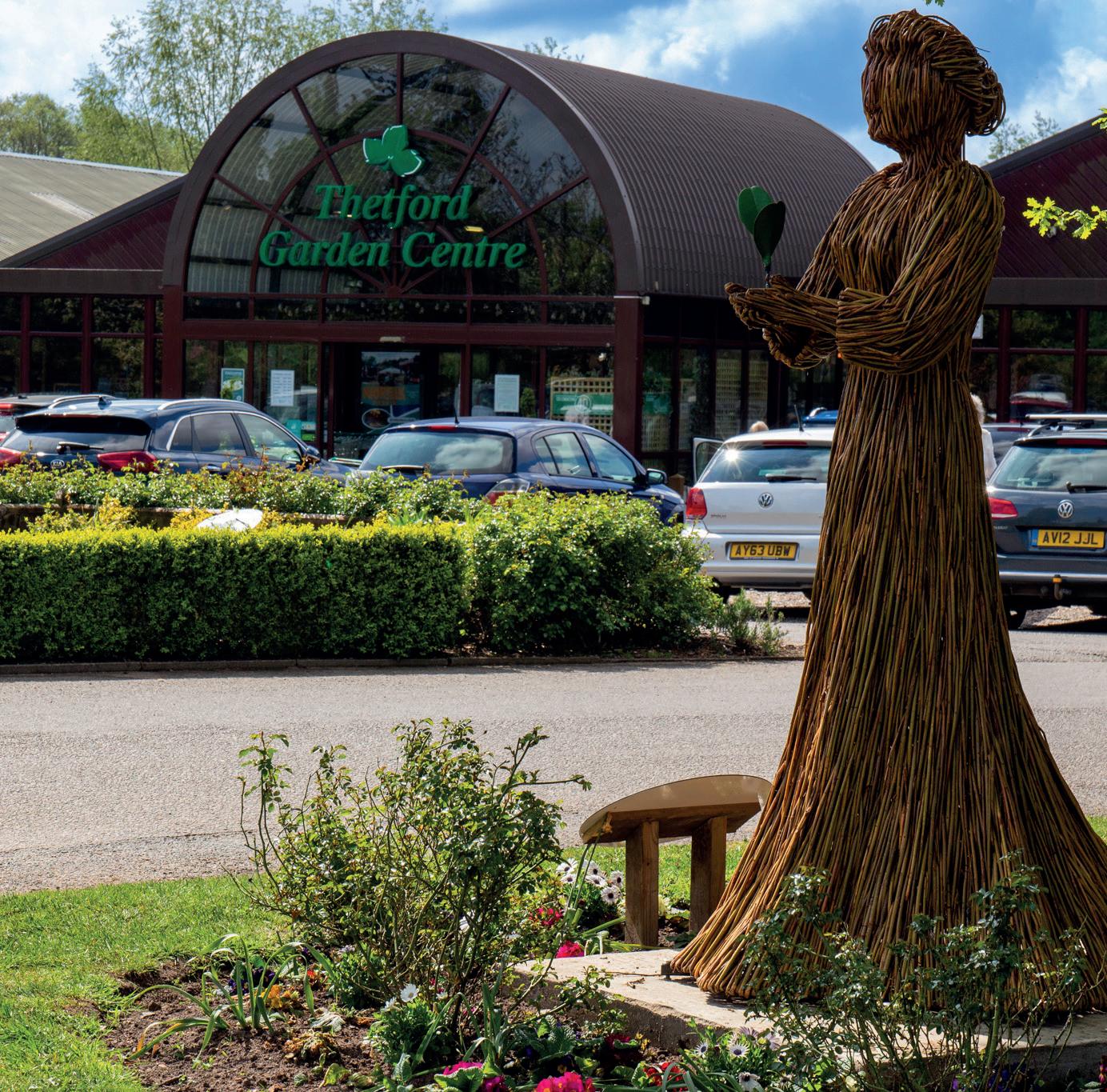
Angela adds “Our staff range is from 18 to 70 years of age, and we’d like to get everyone involved and ensure that our staff know about the certification should a customer enquire.”
years’ time. They will take the list of advisories for improvement, and develop their final score, cementing the business as a trailblazer for other businesses to be inspired by.
B Lab’s standards are multifaceted and that includes the following:-
B Corp Certification is a designation that a business is meeting high standards of verified performance, accountability, and transparency on factors from employee benefits and charitable giving to supply chain practices and input materials.
A comprehensive tool to measure, manage, and improve a company’s positive impact performance for workers, communities, customers, suppliers, and the environment. A required verified score of 80 on the B Impact Assessment also serves as a certification requirement for B Corp Certification.
An assessment of eligibility for B Corp Certification based on a review of potentially negative impacts associated with a company’s industry and other practices.
Additional baseline requirements for large companies which are defined as a parent company generating $5B+ in annual revenue.


To achieve certification, a company must:
• Demonstrate high social and environmental performance by achieving a B Impact Assessment score of 80 or above and passing our risk review. Multinational corporations must also meet baseline requirement standards.
• Make a legal commitment by changing their corporate governance structure to be accountable to all stakeholders, not just shareholders, and achieve benefit corporation status if available.
• Exhibit transparency by allowing information about their performance measured against B Lab’s standards to be publicly available on their B Corp profile on B Lab’s website.
As we move through a period of economic challenges, the industry has proved resilient, but adapting to the needs of younger generations is essential for success. Approximately 1.5 million in the 16-34 age group garden regularly, while an additional 5.7 million garden occasionally. (HTA survey by YouGov Dec 2023).
Their interests in technology, social media, sustainability, and health align well with garden centres. We spoke with industry leaders about connecting with this key demographic.
From TikTok to topsoil, social media and digital marketing are cultivating a new generation of gardeners. Among 16-34-yearolds, WhatsApp (83%) was the most popular social media platform in the last month, followed by Facebook (74%) and Instagram (67%), while TikTok (38%) and Snapchat (37%) (HTA survey by YouGov Dec 2023).
British Garden Centres leverages the power of social media to engage with a diverse audience, which has reaped rewards, as Lucy Hewitt, marketing & social media coordinator tells us: “With 140 active social media accounts, we’ve witnessed significant growth in recent years. In 2024 alone, Instagram impressions surged by 163%, reaching 235% more users.”
“Instagram remains our most effective platform, attracting a wide age range from 25 to 45. Our content strategy caters to novice and experienced gardeners, offering a mix
of informative “how-to” guides and inspiring visuals across our six main brand accounts.
“Collaborating with influencers has been instrumental in amplifying our message. Family-focused influencers effectively reach younger audiences that align with our brand.
“Our Christmas campaign, which typically launches in early October, attracts a younger audience seeking festive experiences and home decor ideas.”
This is something echoed by Bents Garden & Home, which has seen social media position them as “the viral garden centre” on TikTok. “When it comes to the younger generation, we would say there is a difference in attracting them to gardening as opposed to attracting them to a garden centre,” says Helen Bent, head of marketing at bents. “Anything that is ‘trending’ on social channels and recognisable always performs well, as does food, lifestyle, and homewares.
“TikTok has been a huge success with younger audiences, with Bents being referenced as a ‘viral garden centre’ by one user who amassed 17.5K likes and 206.9k views on her post.
“We’ve also had success with our reels, such as our Yorkshire Pudding Wrap, which received 1.3m views, and colleagues in our Winter Food Market were told by customers that they had been recommended to visit by their children who had seen Bents on TikTok.
“Celebrities such as Molly Mae helped our online viral image with check-ins and videos that she has previously posted at Bents.”
“The popularity of these platforms surged during the pandemic as garden centres became a popular destination. Themes such as ‘cosy garden centre vibes’ started to attract

a younger audience, and it has never really dropped off.”
Ramping up social media is also one of Hornby George PR’s key focuses, appointing Cathie Hollands as its social media manager who advises: “Younger audiences have short attention spans, so content must be captivating and impactful. Video content resonates strongly, requiring minimal effort and offering visually engaging experiences. TikTok is the leading platform, with Instagram Reels providing a highly effective alternative.
“In terms of social media, we are not a serious generation; we predominantly use it for entertainment. Humorous and informal content generally resonates better with younger audiences. We love to see self-aware brands— ones that can ’take a joke’ and are willing to take part in trends.
“Your content can’t be a direct advertisement stating, ‘Look at this garden tool’—instead, use visual or text hooks to grab attention while speaking to the younger generation in their language.”
Yarnton Home & Garden works a lot with local social media influencers and partners. Amy Weightman told us: “Social media plays a big role; we use it to build brand awareness and tell our story. Influencers have always been part of that plan, and they help us promote happenings such as the Christmas Notto – our no-hassle grotto experience.
“We have also built a brilliant database of loyal customers, both on social media and CRM. Our Friends of Yarnton database receives our informative, fun, and engaging emails at least once a week. This has been hugely effective in engaging customers.”
Going digital is also key to SBM Life Sciences when promoting its Maxicrop range. “On Instagram, we combine all SBM brands under the “Seezon” umbrella – this allows us to share a mix of inspirational and educational content that spans all areas of gardening, says Angharad James, product manager “Followers who are looking for more in-depth tutorials or how-to guides can visit the website – a hub where consumers can find everything from problem-solving and advice to product recommendations.”
Elho finds that Instagram and TikTok are the most direct routes to younger consumers,
fingered gardeners. This mixture of content and personalities speaks to Elho’s audience in a way that is engaging, interesting, and highly relevant to their own experiences and interests.”
As the UK government embarks on an ambitious plan to build 1.5 million new homes over the next five years, garden retailers are presented with an opportunity to engage a wave of first-time homeowners stepping into gardening for the first time. Terri Jones, managing director of Joy of Plants, outlines the characteristics and needs of this emerging customer base.
“Many of these new gardeners are techsavvy and influenced by social media, yet they often lack gardening experience. This presents a challenge for retailers, as traditional garden centres can overwhelm these novices with an extensive array of plants and products. To attract and retain these customers, retailers must simplify the shopping experience by curating a selection of easy-care plants and providing clear, accessible information.
“Retail staff should adopt a reassuring approach, using language that assumes no prior

as David Nicholson, Sales Manager explains: “TikTok allows us to be more inventive with our video creation, and we follow trending themes and audio to inspire the consumer.
“Influencer marketing is another key strategy, and we work with a variety of accounts across different markets and interests, from houseplant lovers to fully fledged, green-
knowledge and offering tailored educational materials such as the Joy of Plants bed cards or touch screen kiosks with easy-to-digest information. By ensuring that new gardeners experience early success with their plants, retailers can foster this confidence and a lasting love for gardening.”
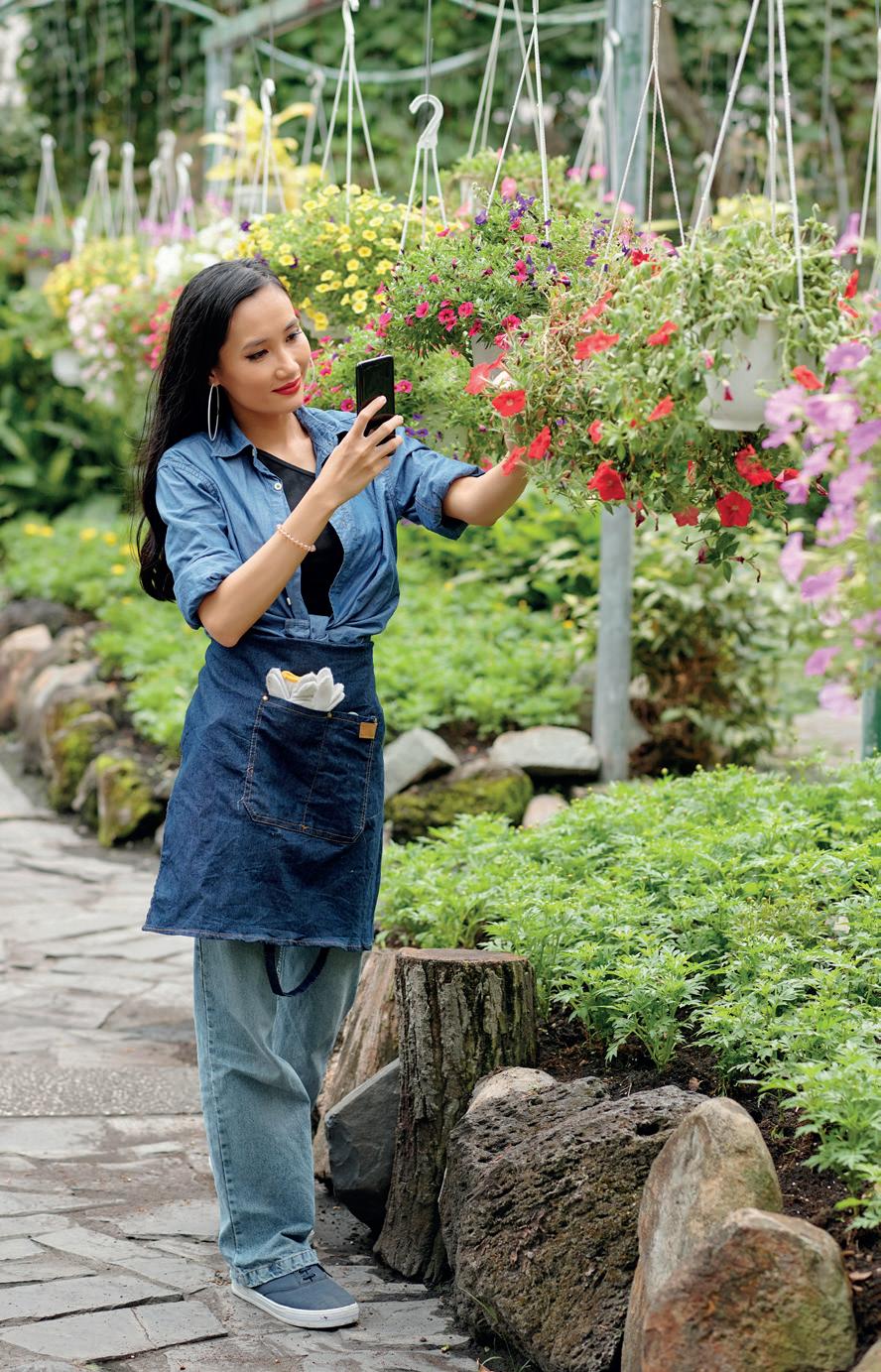
As life has become more fast-paced for the younger generations, there has been an increase in consumers using smart technology in their gardens, as Sarah Bentham, UK marketing manager at GARDENA, explains:
“We have seen an increase in Millennials and Generation Z prioritising ease and convenience in their gardens. Smart technology helps with productivity and speed in many aspects of life - not just the garden.
“People want time back that they can spend doing things they enjoy. Mowing the lawn can be a tedious and time-consuming task, and with products like robotic lawnmowers, that’s half an hour that people can spend doing something else.
“Speed and convenience are key for younger consumers too, including the weight of products, how easy it is to store, and how much time it takes to use. The Flymo Robot lawnmowers are incredibly popular amongst Millennials, especially for those settling into their first homes and with young children and

the Flymo EasiWeeder has been popular as it takes less of a physical toll on the body.
A reassuring and sustainable approach resonates for SBM too as the younger generations seek out more eco-friendly practices and organic gardening, prioritising products and techniques that are kind to the planet. “They are concerned with convenience and simplicity, says Angharad “Many may be beginners or have limited time and space, so they’re drawn to products that deliver results without requiring extensive expertise or effort. Maxicrop taps into this trend as it couldn’t be easier to use – simply add the required amount to a watering can, and the highly concentrated, enriched formulation does all of the hard work for them.”
GARDENA’s smart technology has also captured the imagination of the eco-conscious young consumer: “GARDENA’s has been popular amongst people who are setting up their first gardens, who want to enjoy their thriving outdoor oasis without spending too much time maintaining it. This is particularly appealing to eco-conscious young people, as it allows them to conserve water easily using their phones,“ says Sarah.
“At GARDENA, we’ve seen an increase in people trying to repurpose things they already own. Making fertiliser from household objects and composting on the balcony using kitchen scraps will be on the rise in 2025.
“The GARDENA AquaCount allows users to measure the water quantity used, connecting straight to the tap or hose.”
When it comes to capturing interest in stores, Elho provides a full experience focussing on sustainability. “Younger gardeners treat garden centres as a day out as opposed to just plant shopping. Offering aesthetic visual merchandising which tells the story of each product is a great way to capture the imagination. Our waste collection features pots crafted from ocean plastic, vineyard twine, and recycled coffee grounds. Each piece tells a unique story of how unwanted materials can be creatively repurposed into something beautiful and meaningful,” says David.
It’s also time to rethink school curriculums, one seed at a time and educators are uniting to champion the benefits of gardening. Lee Connelly, AKA The Skinny Jean Gardener is inspiring young minds to embrace gardening through television, radio, books, podcasts and roadshows. Lee’s work has been named the UK’s #1 Children’s Gardening Educator in 2023. 2025 is shaping up to be a busy year, filled with new projects as Lee explains: “The biggest focus for 2025 is stronger conversations with Parliament to bring gardening education into the curriculum. In last two years, these discussions have gained momentum, and I’m optimistic that it will continue to grow louder.
“Another is National Children’s Gardening Week, which we’re working to make bigger. We’ll collaborate with more schools to shine a on the importance of gardening for children.
“I’ll be launching a new activity pack to connect families at home in a sustainable way, alongside a new book coming out later this year, offering practical advice on getting children outdoors and gardening.
“Our School Gardening Success Plan, which supports teachers in bringing gardening to life in schools, is also expanding. We’ll focus on connecting more communities and we’ve launched the Children’s Gardening Coach—a service that helps businesses, brands, and
organisations engage children meaningfully in what they do.”
Ross Dyke , a horticulture student and host of The Plant Pod, has launched “Get Children Growing” to encourage primary schools in the UK to teach children about gardening. He is providing free sunflower grow kits along with prizes for the best growers. His goal is to inspire young people to learn about plant growth and the joy of gardening. He said: “I’d love to see horticulture on the curriculum, so I wanted to start with a project to get children growing in schools.”
The project is being launched in partnership with British Garden Centres and Westland Horticulture, with seeds and pots donated by Mr Fothergill’s Seeds, New Leaf Plants, and Webbs Garden Centres.
Supporting schools is also something close to Yarnton’s heart with the store’s Seeds for Schools campaign, where it gifted seeds and compost to 100 Oxfordshire schools with tips and tricks and ran a competition for the children to take part in. Amy explained: “We also offer a SEN session in our Magic Garden which has seen The Oxfordshire Deaf Society, Downs Syndrome Oxford and Bardwell School have enjoyed.
“We encourage parents, Grandparents and carers to bring children of all ages to our Magic Garden soft play, from babies to 8 years old. We offer activities that include Nurture & Nest (baby Wellbeing course) Baby Massage & Tiny Yoga, Messy Play and of course our most popular Paint, Pot & Play. Crafting, stationery, scrapbooking, messy play, and crystals all seem to engage the best.”
Bents also has a close relationship with Warrington Youth Zone, which provides young people with a wide range of programmes and opportunities to gain and develop life skills. The team has provided them with support for their facilities and has held Circus Workshops.
“We work with local schools, providing them with gardening materials. We are looking to re-establish our ‘Ready Stead Dig’ primary school gardening programme which we have been doing for over 20 years. We hope to encourage participation and kick start that love of gardening whilst also creating a bit of pester power – ‘please take me back to that garden centre mum/dad!” concludes Helen.
Garden Centres are the shining light in UK retail, and one of the reasons why this is the case is because of the ability to diversify and offer a wide variety of products that are new to this sector. Garden Centre Retail explains some areas of garden centres have diversified successfully.
Resilience has been a buzzword for the garden centre market, especially since the global COVID pandemic. Where much of the UK’s high-street retail struggled to adapt and ultimately paid the price over the past five years, garden centres saw an opportunity and seized it with both hands.
Garden centres have become a lot more
than just retail therapy for customers. They are meeting places, restaurants, activity centres for those with children, and havens of safety and calmness. According to the GCA’s Barometer of Trade figures for 2024, catering revenue increased by 19% year on year, and many garden centres supplemented their offerings with children’s play areas, adventure trails, and other ways to keep children entertained. However, one area that has gone under the radar for praise when it comes to the recent success of the industry is the way that garden centres have widened product ranges. Gone are the days of aisles of plants, tools, and soil. Expansion has allowed a lot more room for more surprises on the shelves.
Having seen the success of the restaurants and cafes within the garden centre setting, many businesses have also added a farm shop and deli area, showcasing many local food and drink products. The GCA Barometer of Trade report showed a 15% increase in food hall sales YoY in June 2024.
Businesses like Laylocks Garden Centre in Worcestershire have recently undertaken a huge shop extension and refit, which has included a concession for a local butcher within the new deli area of the store. In a recent interview with Garden Centre Retail, Hannah Warr, director of Laylocks Garden Centre, mentioned the synergy between the restaurant
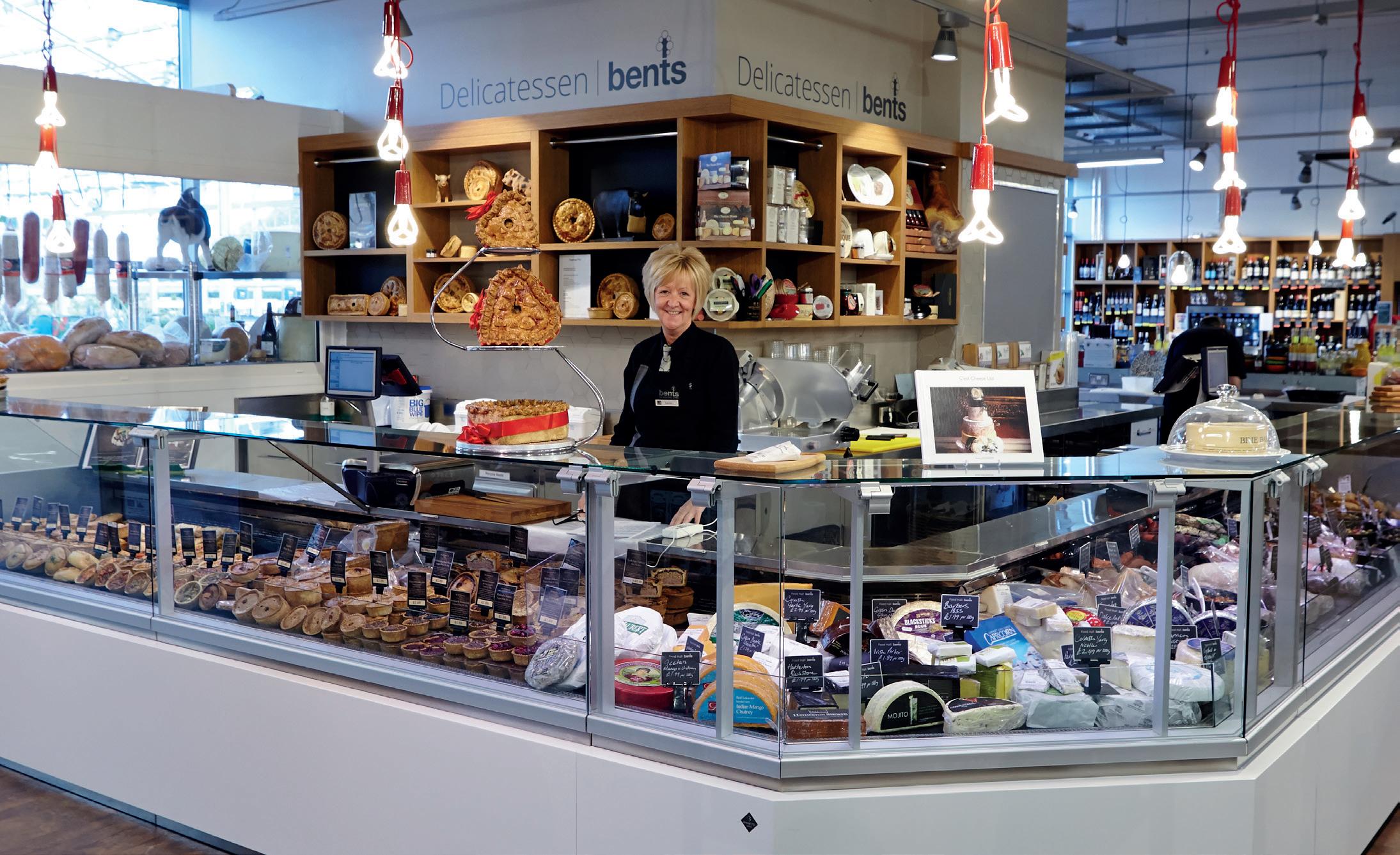
and the new food hall: “We keep everything to local produce as much as we can. We also use the deli — the chef and the deli supervisor liaise. They help each other with food waste.
“We use the same meats in the restaurant and deli. It's a local butcher, a local bread supplier, and we use three counties produce, local around here, for the fresh produce.”
Other garden retail businesses like Gates Garden Centre on the Leicestershire and Rutland border pride themselves on their food hall. Their website showcases the key focus on offering the finest locally sourced produce and a true farm-to-fork experience.
Gates Farm shop offers the finest produce, sourced locally wherever possible – including beef and lamb from its own farm in the village. The stock in the farm shop offers an extensive selection of package-free fruit and vegetables from everyday essentials to seasonal produce.
There’s a natural synergy between garden centres and farm shops, so it’s no surprise to see a crossover between these two sectors.
The UK garden centre market has seen a notable rise in homeware products, driven by key factors. This trend reflects broader shifts in consumer behaviour and market dynamics.
The UK homeware market is projected to grow significantly, with an estimated market size of £18.11 billion in 2025, expected to reach £22.21 billion by 2030.
This growth is fuelled by rising urbanisation, increased consumer purchasing power, and a growing number of households. As garden centres have evolved beyond their traditional role of selling plants and gardening supplies, they are increasingly becoming lifestyle hubs where consumers can purchase a variety of homeware products.
This shift is driven by the desire for convenience and the appeal of creating cohesive, aesthetically pleasing living environments. Consumers are looking for one-stop shops where they can buy everything from garden furniture to indoor decor.
British Garden Centres has forayed into the world of homeware products, including furniture, home fragrances, and decorative items. They offer brands like Ashleigh & Burwood and Freckleface, which are popular for their quality and variety.
Located in Oxfordshire, Burford Garden Company provides a wide selection of indoor
and outdoor furniture. This includes everything from elegant dining sets and comfortable lounge chairs to stylish bistro tables. Their furniture is crafted from high-quality materials such as wood, metal, and rattan, ensuring durability and aesthetic appeal.
The home fragrance section features an array of products designed to create a cosy and inviting atmosphere. This includes scented candles, reed diffusers, and fragrance lamps from well-known brands. These products come in a variety of scents, catering to different preferences and moods.
Their textile range includes cushions, throws, and rugs that are perfect for both indoor and outdoor use, meshing the traditional garden centre product, with something new and exciting.
Garden centres have also ventured into the health and wellness sector, offering a diverse range of health and wellness products.
Many garden centres stock a variety of herbal teas, essential oils, and dietary supplements. These products are aimed at boosting immunity, digestion, and promoting well-being. Popular items are echinacea for immune support, chamomile for relaxation, and peppermint for digestive health.
Natural beauty products are a growing trend in garden centres. You can find lotions, creams, and facial masks made from plant-based ingredients. These products often feature ingredients like aloe vera, lavender, and rosehip oil, known for soothing and rejuvenating properties. Some centres also offer handmade soaps and bath salts.
Essential oils and diffusers are popular items in garden centres. Aromatherapy products are used to promote relaxation, reduce stress, and improve mood. Common essential oils include lavender for relaxation, eucalyptus for respiratory health, and citrus oils for an energy boost. Diffusers, oil burners, and aromatherapy candles are also available to help create a calming atmosphere at home.
Many garden centres offer a selection of organic and health-focused snacks and beverages. You might find herbal teas, organic nuts, dried fruits, and health bars. These products are sourced from local producers,
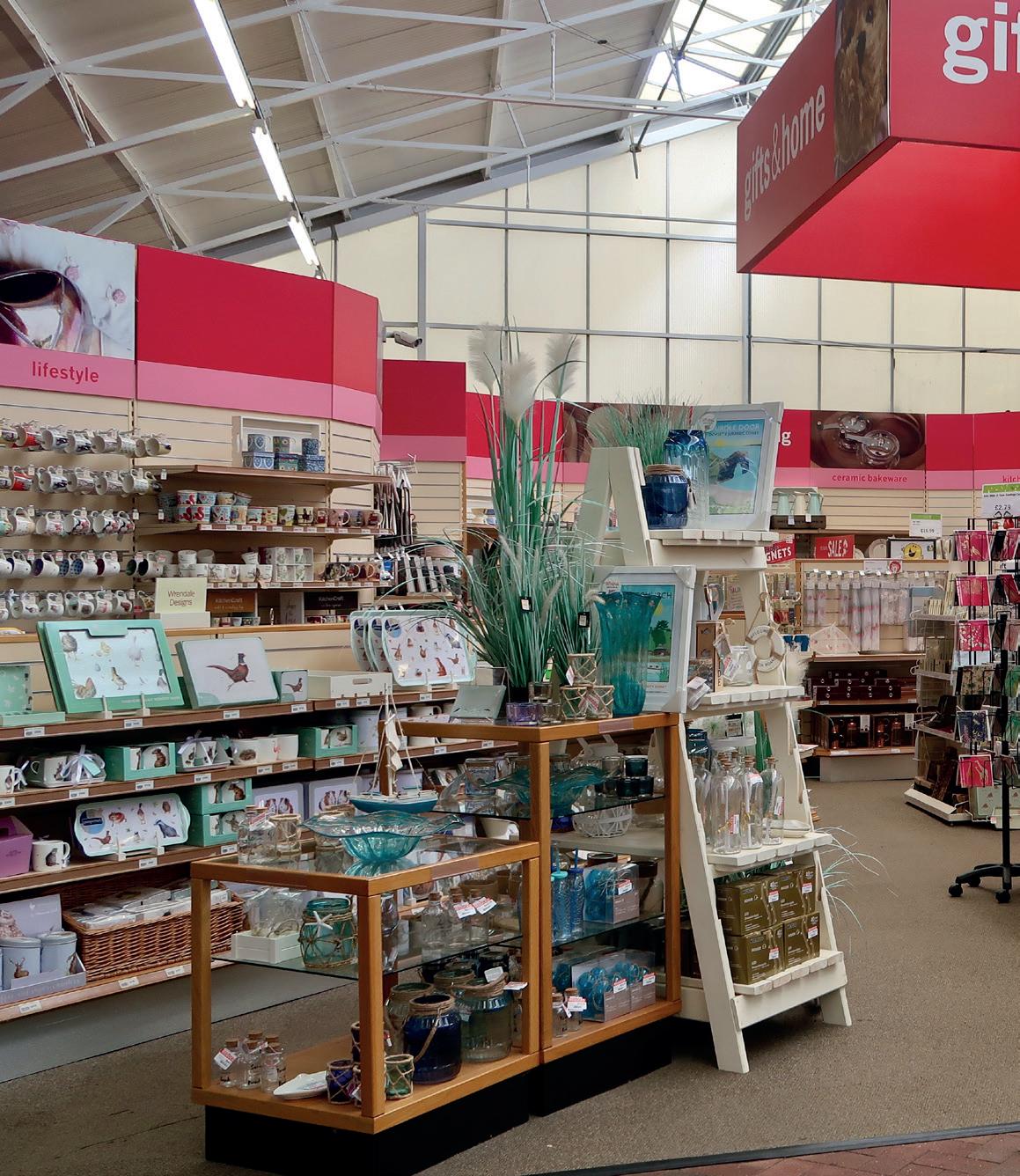
emphasising sustainability and quality.
To complement their product offerings, many garden centres host workshops and classes focused on health and wellness. These might include sessions on herbal medicine, yoga, mindfulness, and even DIY skincare. These events provide valuable knowledge and hands-on experience, helping customers integrate wellness practices in daily life.
Located in Warfield, Berkshire, Moss End Garden Village is a destination for health and wellness. They offer a variety of herbal remedies, essential oils, and dietary supplements aimed at boosting overall wellbeing. Additionally, they have practitioners of health and wellness treatments on-site.
With multiple locations across the UK, Hillier Garden Centres focuses on the wellness benefits of gardening. They offer workshops on topics like herbal medicine and mindfulness and stock a range of natural beauty products,
including lotions and creams made from plantbased ingredients. Hillier also emphasises the health benefits of growing your own food, offering a variety of herbs and vegetables.
Located in Tiptree, Essex, Perrywood Garden Centre offers a wide selection of health and wellness products. They stock essential oils, diffusers, and other aromatherapy products to promote relaxation and stress relief. Perrywood also hosts wellness workshops and classes, providing valuable knowledge on integrating wellness practices into daily life.
With 19 locations in the UK, Notcutts Garden Centres offers a range of health
Books, stationery and craft supplies
It’s rare now to walk into a garden centre and not see a range of the most recent novels on the shelves. They’re usually alongside good quality stationery and craft supplies, making this another area that garden centres have seen success in.
In terms of books, shoppers in garden centres can find all interests covered. Nonfiction topics often feature gardening guides, cook books and history, whereas the fiction section has titles and well-known authors across a range of genres.
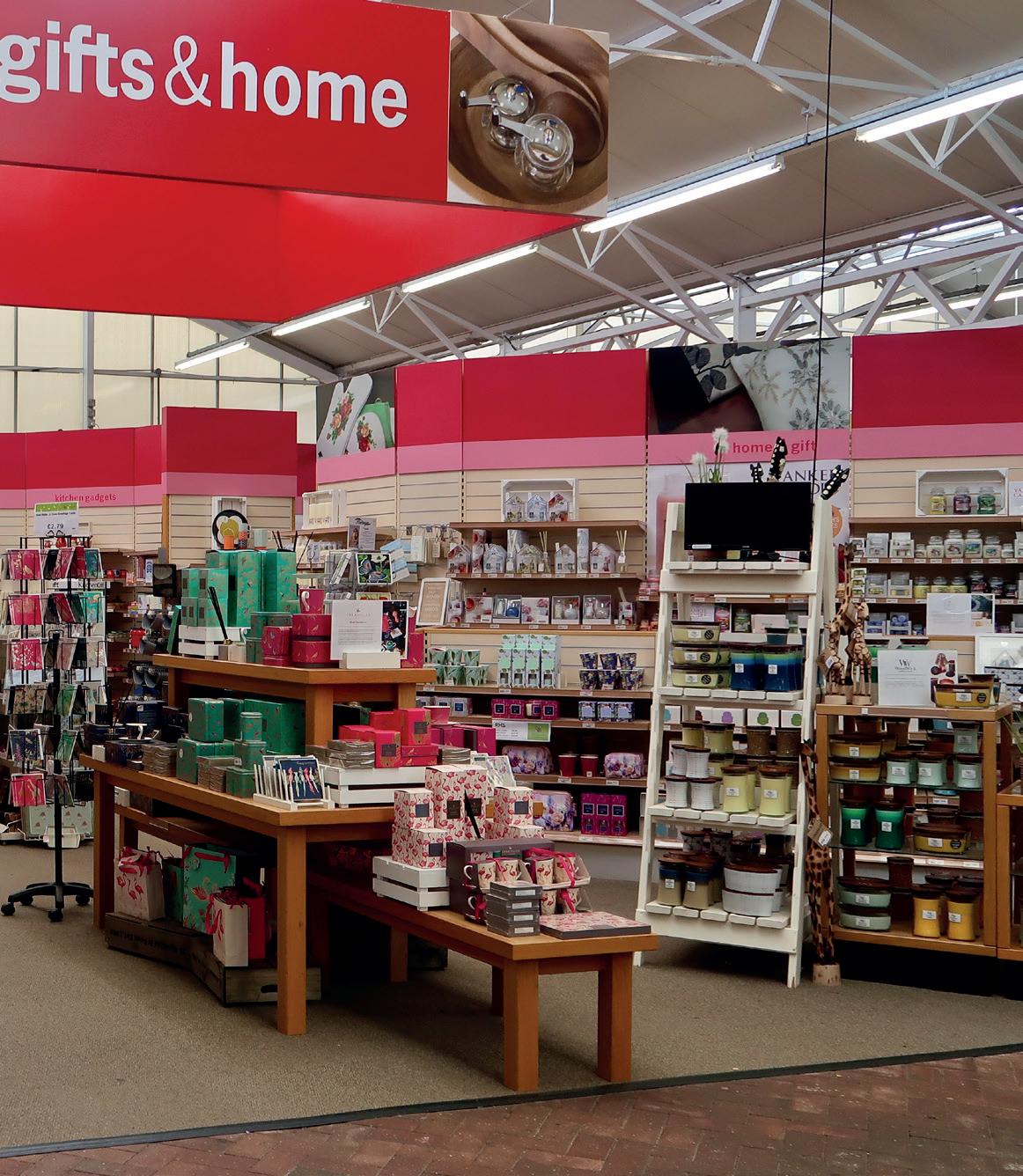
and wellness products, including natural skincare items and healthy snacks. They also provide workshops on gardening for wellness, emphasising the mental and physical benefits of gardening.
As one of the largest garden centre chains in the UK, Dobbies offers a variety of health and wellness products. They stock herbal teas, organic snacks, and beauty products made from natural ingredients. Dobbies also focuses on the wellness benefits of gardening, offering plants known for their health benefits, such as air-purifying plants and herbs for cooking.
Dobbies features an extensive selection of books that inspire and educate, making them perfect for garden enthusiasts and families alike.
Bosworths stocks a variety of books covering topics such as architecture, history, and lifestyle, including titles like "The English Abbey Explained" and "Scandi Rustic".
By offering books, garden centres aim to educate and inspire their customers, encouraging them to explore new hobbies and enhance their gardening knowledge.
Stationery items available at garden centres include notebooks, pens, planners, greeting cards, journals, and notepads. These products cater to both practical needs and creative projects.
The Works, which has concessions in a few garden centres, including Haddenham Garden Centre, offers a wide selection of stationery items, providing customers with everything they need for organisation and creativity.
Bosworths features stylish and functional stationery products from brands like Designworks Inc.
Stationery products align with the garden centres' goal of providing a comprehensive shopping experience, meeting the diverse needs of their customers.
The remarkable success of the UK garden centres can be attributed to their strategic diversification and adaptability. By expanding
beyond traditional gardening products, these centres have transformed into multifaceted retail destinations that cater to a wide range of consumer needs. The integration of farm shops, food halls, homeware products, health and wellness items, and even books and stationery have created a comprehensive shopping experience that appeals to diverse customer interests.
This diversification has not only boosted sales but also enhanced the overall customer experience, making garden centres popular destinations for families and individuals alike. The synergy between different product offerings, such as local produce in farm shops and restaurants, has further strengthened their appeal. Additionally, the incorporation of wellness workshops and activities has positioned garden centres as community hubs that promote well-being.
As the market continues to evolve, garden centres are well-positioned to maintain their growth trajectory by staying attuned to consumer trends and preferences. Their ability to innovate and offer a diverse product range will likely keep them at the forefront of UK retail, setting a benchmark for resilience and adaptability in the industry.



Click, seal and store! The storage superhero makes it easy to prepare healthy meals, store them in either refrigerator or freezer and on top of that heat up in the microwave or oven.
• Versatile kitchen champion
• Innovative lid with one clip, close air and aroma tight with one click
• Modular stackable and compact storage
• Suitable for fridge, freezer, oven, microwave and dishwasher
No matter how demanding you are: Modula storage boxes are designed for it. With their transparent boxes and lids they give instant view of your stock.
• Instant view of your stock
• Stackable rectangular and square storage boxes
• Kitchen drawer, kitchen cabinet and refrigerator
• Dishwasher safe
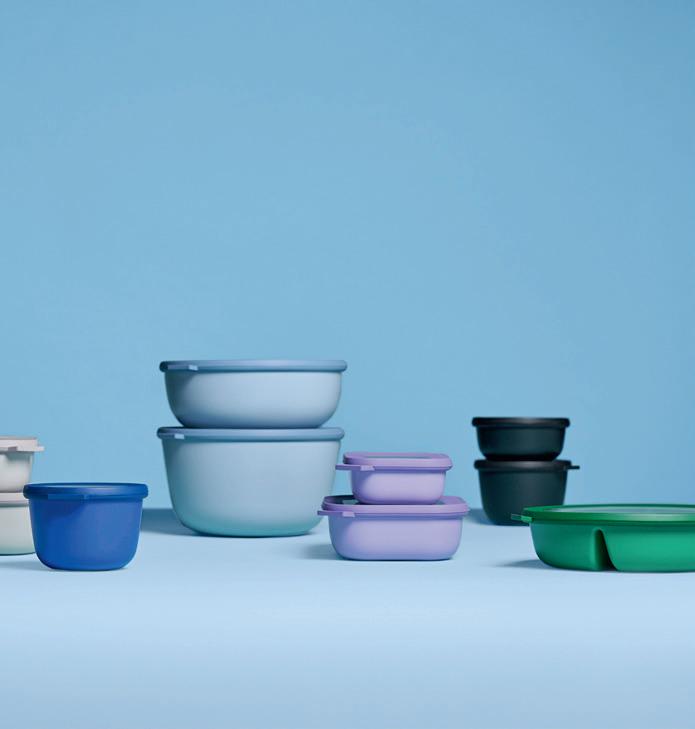
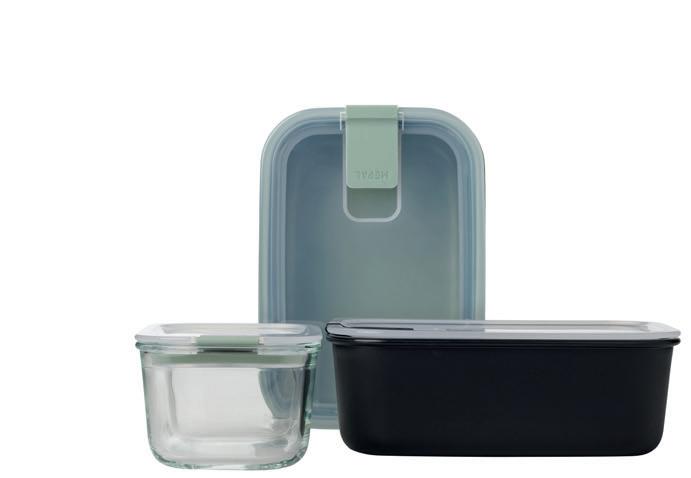

The Cirqula collection has been designed specifically for the complete ‘circle of use”. The food in these colourful bowls can be stored in the freezer or fridge, heated up in the microwave and can then be served at the table.
• The bowl that does it all
• Air and aroma tight
• Rectangular, round, round with three compartments
• Suitable for fridge, freezer, microwave and dishwasher To discover more about Mepal’s storage range, or other product ranges, contact j.stalder@mepal.com or call 07384 317364



Unlike other ‘fresh juice’ brands — when we say it’s fresh, it’s fresh. No additives, no preservatives, no artificial colouring or sweeteners. Just pure, unadulterated freshly squeezed juice — infused with a kick of vodka.
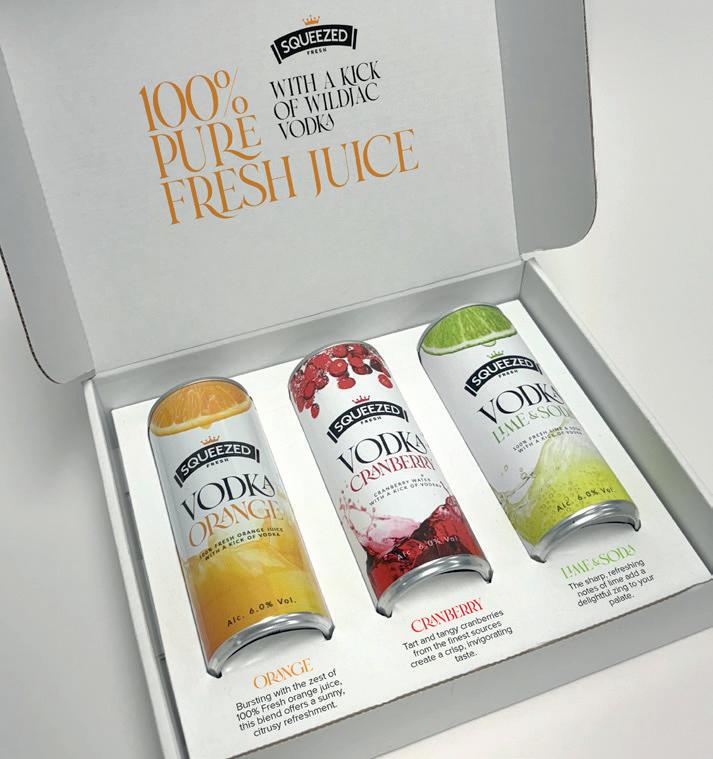

Giving it typically represents between 15% to 30% of total sales,
having a comprehensive hospitality offering is key for most garden centres across cafes, restaurants and other food outlets. This trend has grown in recent years with centres increasingly expanding their offering to enhance revenues and the customers’ in-store experience.
Maximising hospitality also helps to improve efficiency, reduce costs and increase loyalty and ultimately, by delivering excellent customer service, results in more frequent and longer visits, additional spending and the attraction of new customers. The ability to flex with the usual daily and seasonal hospitality demands is also crucial to ensure front and back-of-house teams can be

as efficient as possible and co-ordinate their activities for a seamless service.
An EPoS and retail management solution is fundamental in achieving these goals and, as specialists for the garden centre sector, Keith Bateman, Co-CEO of Davidson Richards explains, how hospitality forms an integral part of their OpSuite system. “We are proud to work with such a large number of independent garden centres including those featured below. Serving the UK and Ireland, our focus is on building long-term relationships, with some customers having been with us for over 20 years to date. With our expertise and experience in the sector and by harnessing technology and trends, our proven OpSuite system allows our retailers to manage their activities across the entire estate from one solution, whether that’s for a single site, across multiple stores or in destination centres.”
Tim Goold, owner of Henry Street Garden Centre adds: “OpSuite allows us to serve our customers quickly and avoid queues at the tills.
Once ordered, the various items are sent to designated printers such as the barista station, cakes and kitchen and any special requests or allergens are also included which is important. Hospitality also plays an important role as part of our overall customer loyalty scheme in place; ensuring they remain centric to all that we do.”
There are a number of ways in which
customers can order, complementing the usual counter service. These include table service with payment either via a mobile device or at the tills. Alexander MacDonald, partner of Fairleys Garden Centre comments: “For us, hospitality is key. Having moved to Davidson Richards for OpSuite, its advanced features have been a great help. We offer a personal ordering and payment service at the table using the intuitive point-of-sale tablets and customer reactions have been great. We can have different table layouts for various hospitality areas which are flexible for things like seasonal events. Quantities is another useful feature which alerts our front-of-house team when a given item is running low to avoid customer disappointment when ordering.”
Furthermore, in today’s digital world, QR code ordering is another way to order and pay, with customers using their phone by scanning the code on the table or menu; all without leaving the comfort of their seat and helpful for those with younger or older members of their party. As part of their extensive restaurant redevelopment activities underway, Longacres will be introducing this OpSuite feature and as Michael Ainley, Longacres, IT manager explains: “Taking orders via the QR code feature will be invaluable with our established counter service to cater for the huge demand in our busy restaurants and provide the level of service our customers expect. Due to the ease and convenience of QR code ordering from your seat, an increase in turnover is anticipated for add-on sales such as additional hot drinks and puddings at the end of a meal.”
Ben Rayner, owner of Scotsdales comments: “We’ve partnered with Davidson Richards for


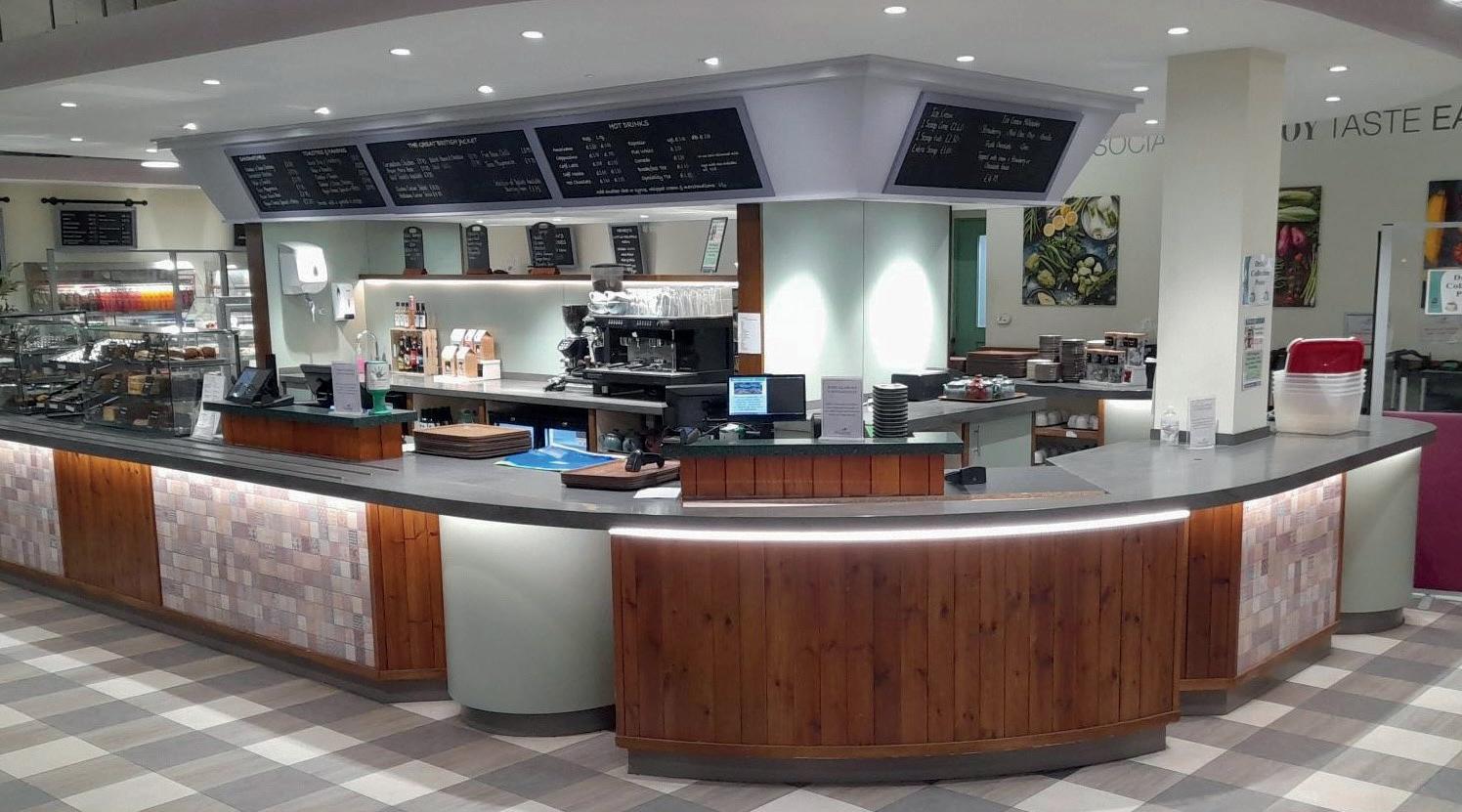
12 years and through working closely with their team includes ex-garden centre retailers, we benefit from all the new features introduced. With our exciting restaurant expansion plans well underway, we will be adopting the kitchen display screens to enhance our hospitality operations. We’ll also be introducing QR code ordering so customers have a choice and we can deliver an easier service.”
As they become increasingly prevalent in everyday life, self-serve kiosks are also perfect for hospitality and available with OpSuite as fully integrated. Providing multiple benefits, they optimise valuable space in-store and focus on delivering to reduce the waiting times. Secure, easy-to-use, truly enhance the customer’s in-store overall experience.
Hospitality also plays a strategic role in achieving cross-sales and other business areas such as plants, gifts or seasonal items with
bounce-back couponing has widespread uses to encourage repeat visits and spending. Linked to spending or a particular item purchased, a free drink coupon for example can be provided, for redemption when you choose, such as a quieter day of the week or month.
Keith adds: “OpSuite also has KPI dashboards and a wealth of real-time reports which the hospitality and wider teams can rely upon for confident decision making in their given role. Sales, trends and customer habits can be analysed, resulting in greater profiling and management of stock and staffing requirements.”
Davidson Richards
01332 383231
retail@davrich.co.uk
davrich.co.uk
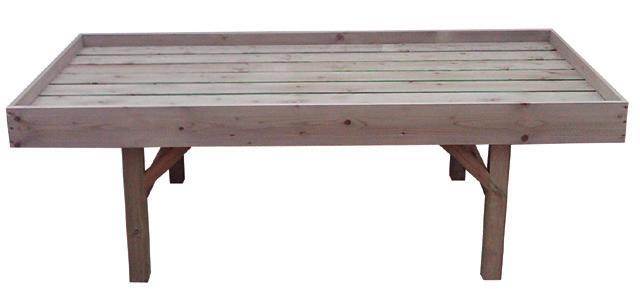

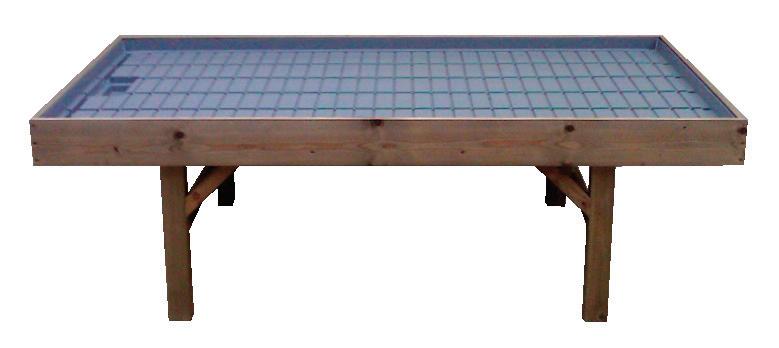

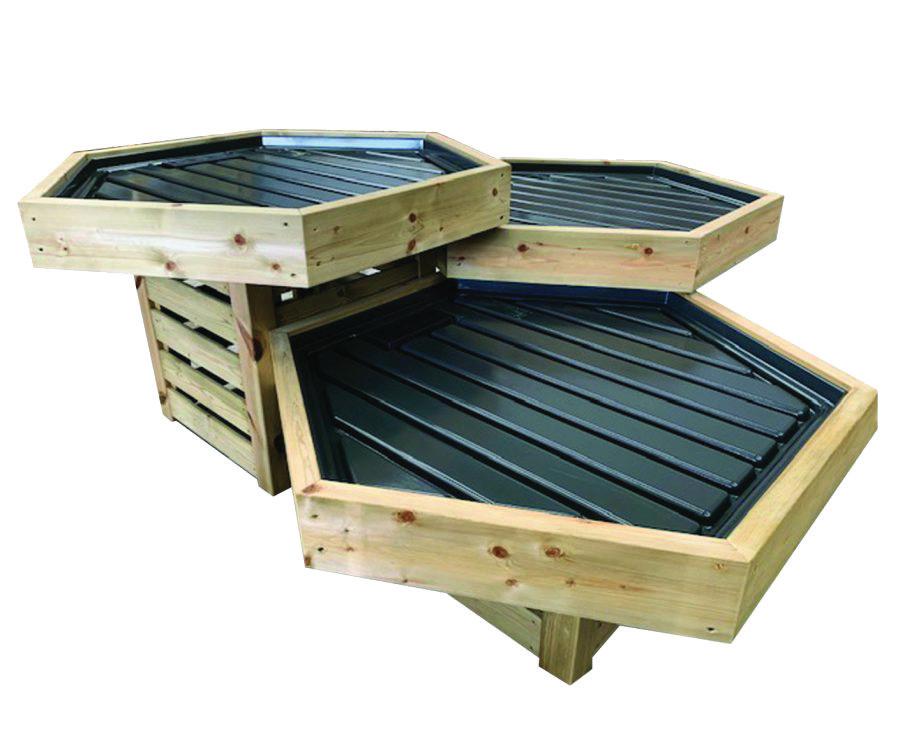


and the new food hall: “We keep everything to local produce as much as we can. We also use the deli — the chef and the deli supervisor liaise. They help each other with food waste.
“We use the same meats in the restaurant and deli. It's a local butcher, a local bread supplier, and we use three counties produce, local around here, for the fresh produce.”
Other garden retail businesses like Gates Garden Centre on the Leicestershire and Rutland border pride themselves on their food hall. Their website showcases the key focus on offering the finest locally sourced produce and a true farm-to-fork experience.
Gates Farm shop offers the finest produce, sourced locally wherever possible – including beef and lamb from its own farm in the village. The stock in the farm shop offers an extensive selection of package-free fruit and vegetables from everyday essentials to seasonal produce.
There’s a natural synergy between garden centres and farm shops, so it’s no surprise to see a crossover between these two sectors.
and outdoor furniture. This includes everything from elegant dining sets and comfortable lounge chairs to stylish bistro tables. Their furniture is crafted from high-quality materials such as wood, metal, and rattan, ensuring durability and aesthetic appeal.
The home fragrance section features an array of products designed to create a cosy and inviting atmosphere. This includes scented candles, reed diffusers, and fragrance lamps from well-known brands. These products come in a variety of scents, catering to different preferences and moods.
Their textile range includes cushions, throws, and rugs that are perfect for both indoor and outdoor use, meshing the traditional garden centre product, with something new and exciting.
Essential oils and diffusers are popular items in garden centres. Aromatherapy products are used to promote relaxation, reduce stress, and improve mood. Common essential oils include lavender for relaxation, eucalyptus for respiratory health, and citrus oils for an energy boost. Diffusers, oil burners, and aromatherapy candles are also available to help create a calming atmosphere at home.
Many garden centres offer a selection of organic and health-focused snacks and beverages. You might find herbal teas, organic nuts, dried fruits, and health bars. These products are sourced from local producers,
Now is the time to stock up on your summer-flowering bulbs for the upcoming
The UK garden centre market has seen a notable rise in homeware products, driven by key factors. This trend reflects broader shifts in consumer behaviour and market dynamics.
GHealth and Wellness Garden centres have also ventured into the health and wellness sector, offering a diverse range of health and wellness products.
arden centres in the UK should stock summer flowering bulbs now to capitalise on the upcoming planting season and boost revenue. Summer bulbs, such as dahlias, gladioli, and lilies, are typically planted in spring, from March to May, when the soil begins to warm up. These bulbs thrive in welldrained soil and sunny locations, making them ideal for a variety of garden settings.
The UK homeware market is projected to grow significantly, with an estimated market size of £18.11 billion in 2025, expected to reach £22.21 billion by 2030.
This growth is fuelled by rising urbanisation, increased consumer purchasing power, and a growing number of households. As garden centres have evolved beyond their traditional role of selling plants and gardening supplies, they are increasingly becoming lifestyle hubs where consumers can purchase a variety of homeware products.
Offering a diverse range of summer bulbs can attract a wide customer base. Popular varieties include the vibrant dahlias, which bloom from mid-summer to autumn, and the elegant gladioli, known for their tall, colourful spikes. Lilies, with their fragrant and striking flowers, are also a favourite among gardeners.
This shift is driven by the desire for convenience and the appeal of creating cohesive, aesthetically pleasing living environments. Consumers are looking for one-stop shops where they can buy everything from garden furniture to indoor decor.
Stocking these bulbs early allows garden centres to meet the demand of enthusiastic gardeners planning their summer displays. Additionally, summer bulbs can be marketed as low-maintenance options that provide longlasting colour and attract pollinators, enhancing garden biodiversity.
British Garden Centres has forayed into the world of homeware products, including furniture, home fragrances, and decorative items. They offer brands like Ashleigh & Burwood and Freckleface, which are popular for their quality and variety.
Located in Oxfordshire, Burford Garden Company provides a wide selection of indoor
From a revenue perspective, summer bulbs offer repeat sales opportunities as customers return for more varieties or replacements. They can also be bundled with related products
like compost, fertilisers, and gardening tools, increasing overall sales. By promoting the benefits and beauty of summer flowering bulbs, garden centres can enhance customer satisfaction and drive business growth.
Garden Centre Retail has picked out a selection of bulbs for the season.
Many garden centres stock a variety of herbal teas, essential oils, and dietary supplements. These products are aimed at boosting immunity, digestion, and promoting well-being. Popular items are echinacea for immune support, chamomile for relaxation, and peppermint for digestive health.
Natural beauty products are a growing trend in garden centres. You can find lotions, creams, and facial masks made from plant-based ingredients. These products often feature ingredients like aloe vera, lavender, and rosehip oil, known for soothing and rejuvenating properties. Some centres also offer handmade soaps and bath salts.

native to South Africa. It features tall, slender stems topped with clusters of trumpet-shaped flowers in shades of blue, white, and purple. The plant’s strap-like leaves can be evergreen or deciduous, depending on the variety.
Planting Agapanthus is best done in spring after the last frost. The rhizomes should be planted two inches deep and 12 to 18 inches apart in well-draining fertile soil. Agapanthus thrives in full sun but can tolerate partial shade, especially in hotter regions. For optimal growth, Agapanthus requires regular watering, particularly during the growing season. However, once established, it is relatively drought-tolerant.
emphasising sustainability and quality.
To complement their product offerings, many garden centres host workshops and classes focused on health and wellness. These might include sessions on herbal medicine, yoga, mindfulness, and even DIY skincare. These events provide valuable knowledge and hands-on experience, helping customers integrate wellness practices in daily life.
Agapanthus Agapanthus, also
as the Lily of the Nile or African Lily, is a stunning perennial plant
Located in Warfield, Berkshire, Moss End Garden Village is a destination for health and wellness. They offer a variety of herbal remedies, essential oils, and dietary supplements aimed at boosting overall wellbeing. Additionally, they have practitioners of health and wellness treatments on-site.
Agapanthus is generally low maintenance but may need protection from frost in colder areas. In such cases, mulching heavily or moving potted plants indoors can help. Deadheading spent flowers can promote further blooming and maintain a tidy appearance.
With its vibrant blooms and easy care, Agapanthus is a fantastic addition to any garden, providing long-lasting colour and attracting pollinators like bees and butterflies.
With multiple locations across the UK, Hillier Garden Centres focuses on the wellness benefits of gardening. They offer workshops on topics like herbal medicine and mindfulness and stock a range of natural beauty products,
Crocosmia
Crocosmia, also known as Montbretia or

Coppertips is a vibrant perennial plant also native to South Africa. It features arching stems adorned with clusters of funnel-shaped flowers in fiery shades of red, orange, and yellow. The plant’s sword-like leaves add a striking architectural element to gardens.
Planting Crocosmia is best done in spring after the danger of frost has passed. The corms should be planted 3 to 5 inches deep and 6 to 8 inches apart in well-draining, slightly acidic soil. Crocosmia thrives in full sun but can tolerate partial shade.
For optimal growth, Crocosmia requires regular watering during the growing season to keep the soil evenly moist. However, it is relatively drought-tolerant once established.
Crocosmia is low maintenance but may need support to keep its tall flower stalks upright. Deadheading spent flowers can promote blooming and maintain a tidy appearance. In colder regions, the corms to be lifted and stored indoors over winter.
Dahlias
Dahlias are stunning, tuberous perennials known for their vibrant and diverse blooms. They come in a wide range of colours, like red, pink, orange, yellow, purple, and white, and can vary in size from petite two inch pompoms to giant 15-inch ‘dinner plates.’ Dahlias typically grow 1 to 6 feet tall, depending on the variety.
Planting dahlias is best done in late spring after the danger of frost has passed and the soil has warmed to at least 15°C. The tubers should be planted 2 to 6 inches deep, with smaller varieties spaced 12 inches apart and larger varieties up to three feet apart to allow for proper air circulation. Dahlias thrive in full sun and well-drained, loamy soil with a neutral to slightly acidic pH.
For optimal growth, dahlias require regular watering, especially during dry spells. Water deeply once or twice a week, ensuring the soil remains moist but not waterlogged. Deadheading spent flowers will promote

continuous blooming and keep the plant looking tidy.
Dahlias are often treated as annuals, but the tubers can grow in first frost and stored indoors in a cool, dry place over winter.
Gladioli, also known as sword lilies, are striking perennials known for their tall spikes of vibrant, trumpet-shaped flowers. They come in a wide range of colours, like red, pink, orange, yellow, purple, and white. Gladioli typically grow 2 to 5 feet tall, making them a great addition to any garden. Planting gladioli is best done in spring after the danger of frost has passed and the soil has warmed to at least 13°C. The corms should be planted 4 to 6 inches deep and 6 to 8 inches apart in well-draining sandy or loamy soil. Gladioli thrive in full sun and tolerate partial shade.
For optimal growth, gladioli require regular watering, especially during dry spells. Water deeply once a week to keep the soil consistently moist.

Liatris, or blazing star, is a striking perennial native to North American prairies. It features tall, bottlebrush-like spikes of purple, pink, or white flowers that bloom from the top down. The plant’s grass-like leaves form a basal clump and turn an attractive bronze colour towards the end of the season.
Planting Liatris is best done in spring, after the last frost. The corms should be planted 2 to 4 inches deep and 12 to 15 inches apart in well-draining, slightly acidic to neutral soil. Liatris thrives in full sun but can tolerate partial shade.
For optimal growth, Liatris requires regular watering during the first year to establish a strong root system. Once established, it is relatively drought-tolerant.
Liatris is generally resistant to pests and diseases. Deadheading spent flowers can promote further blooming.



















































It seems strange to think about Christmas 2025 just over a month past the 2024 season, but garden centres in the UK will be busy preparing their festive offering, 11 months out from the event. This year promises to be particularly exciting, with a variety of emerging trends poised to influence the Christmas market. For garden centres, understanding and embracing these trends will be key to attracting customers and boosting sales during the busiest time of the year.
The Christmas season is a crucial period for garden centres, offering a unique opportunity to showcase a wide range of products, from festive decorations and lighting to seasonal plants and gifts. With consumers eager to create magical holiday experiences, garden centres must stay ahead of the curve by anticipating their needs and preferences. This involves not only stocking the right products but also creating an inviting and festive atmosphere that encourages shoppers to linger and explore.
In recent years, consumer preferences have evolved significantly, driven by factors such as environmental awareness, technological advancements, and a desire for nostalgia. These shifts have led to the emergence of new trends that garden centres can take advantage of to enhance their offerings and stand out in a competitive market.
The role of garden centres extends beyond merely selling products; they are also community hubs where people come to find inspiration and connect with others. By creating a selection of products that reflect the latest trends, garden centres can foster a sense of excitement and anticipation among their customers. This not only drives sales but also builds loyalty and encourages repeat visits.
As we look ahead to Christmas 2025, it's clear that garden centres have a wealth of opportunities to delight their customers and make the holiday season truly special.
By understanding the key trends shaping the market, garden centres can create a festive experience that resonates with shoppers and sets the stage for a successful holiday season.
Here’s some of the trends that will be on display in the run up to this festive season
Organic materials like wood, burlap, and linen, which create a contrast with traditional decorations will be high on the Instagram trending pages next Christmas. This trend is all about bringing the beauty of the outdoors inside, creating a serene and organic holiday atmosphere. This trend emphasises the use of natural materials and earthy tones, reflecting a growing consumer desire for sustainability and a connection to nature. Garden centres can tap into this trend by offering a variety of products that highlight the simplicity and elegance of natural elements. Key components of this trend include decorations made from wood, pinecones, and dried botanicals. These materials not only add a rustic charm to holiday decor but also align with the eco-friendly preferences of many shoppers. Items such as wooden ornaments, wreaths adorned with dried flowers, and garlands made from natural fibers like jute and hemp are expected to be particularly popular.
Additionally, incorporating elements like moss, twigs, and berries can enhance the natural aesthetic and provide a touch of woodland magic.
Shades of green, brown, and beige dominate this trend, creating a calming and harmonious environment. These colours can be complemented with soft, warm lighting to evoke the cosy feeling of a winter forest. Garden centres can also offer potted plants and small trees, such as miniature pines and spruces, which can be decorated with simple, nature-inspired ornaments.
This trend not only appeals to those looking to reduce their environmental impact but also to anyone seeking a peaceful and understated holiday aesthetic.

Paper decorations are a big part of Christmas decor in 2025, according to Lumina. The trend tends to allow customers to let their imagination fly, with do-it-yourself paper lanterns for lights amongst the most popular creations.
One of the key aspects of this trend is the DIY appeal. Many consumers are looking for ways to personalise their holiday decorations, and paper offers the perfect medium for this. Garden centres can provide kits and materials for customers to create their own paper ornaments, garlands, and stars. These DIY projects not only add a personal touch to holiday decor but also make for enjoyable family activities during the festive season.
In addition to DIY options, ready-made paper decorations are also in high demand. Delicate paper snowflakes, elegant paper lanterns, and intricate origami figures can add a sophisticated and whimsical touch to any Christmas setting. These decorations are lightweight, easy to store, and can be reused year after year, making them a practical choice for environmentally conscious consumers.

The colour palette for paper decorations in 2025 includes soft pastels, metallics, and traditional holiday colours such as red and green. These hues can be mixed and matched to create a cohesive and visually appealing display during Christmas.
The oversized decorations trend for Christmas 2025 is all about making a bold statement with larger-than-life festive decor. This trend focuses on creating eye-catching displays that captivate and delight, transforming any space into a magical holiday wonderland.
Giant baubles, stars, and snowflakes can be hung from trees, ceilings, or even used as standalone pieces to create a striking visual impact. These decorations come in a range of materials, including shatterproof plastic, metal, and even fabric, ensuring durability and versatility.
In addition to ornaments, oversized inflatables are also gaining popularity. These fun and festive decorations can be placed in gardens, on porches, or even indoors to create a whimsical holiday atmosphere.
From giant Santa Claus figures to enormous reindeer and snowmen, inflatables are a playful way to embrace the trend.
This style keeps the traditional clean and uncluttered look but adds warm shades like terracottas, browns, and beiges, much like the 2024 Pantone colour of the Year, Mocha Mousse.
Key components of this trend include decorations in soft, earthy tones such as beige, taupe, and muted greens. These colours create a calming backdrop that allows the beauty of natural materials to shine. Items like wooden ornaments, linen table runners, and ceramic candle holders add texture and warmth without overwhelming the senses.
Another aspect of the warm minimalism trend is the use of subtle, ambient lighting. Soft, warm lights, such as fairy lights and candles, help to create a cosy and intimate atmosphere. These lighting elements not only add a festive glow but also contribute to the overall sense of calm and relaxation.








